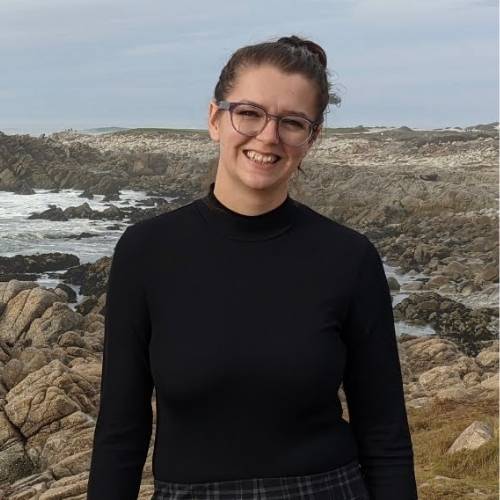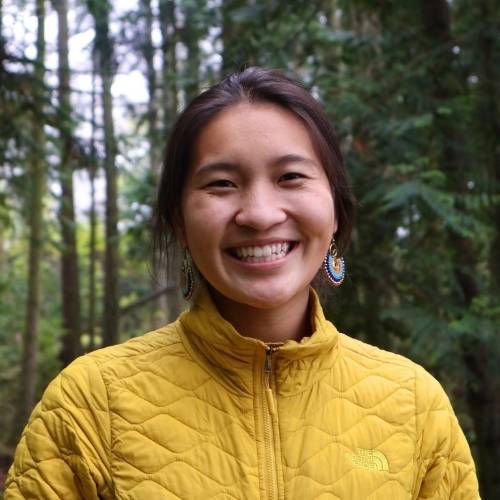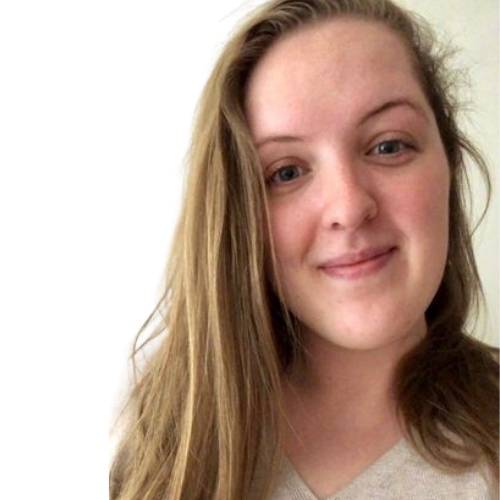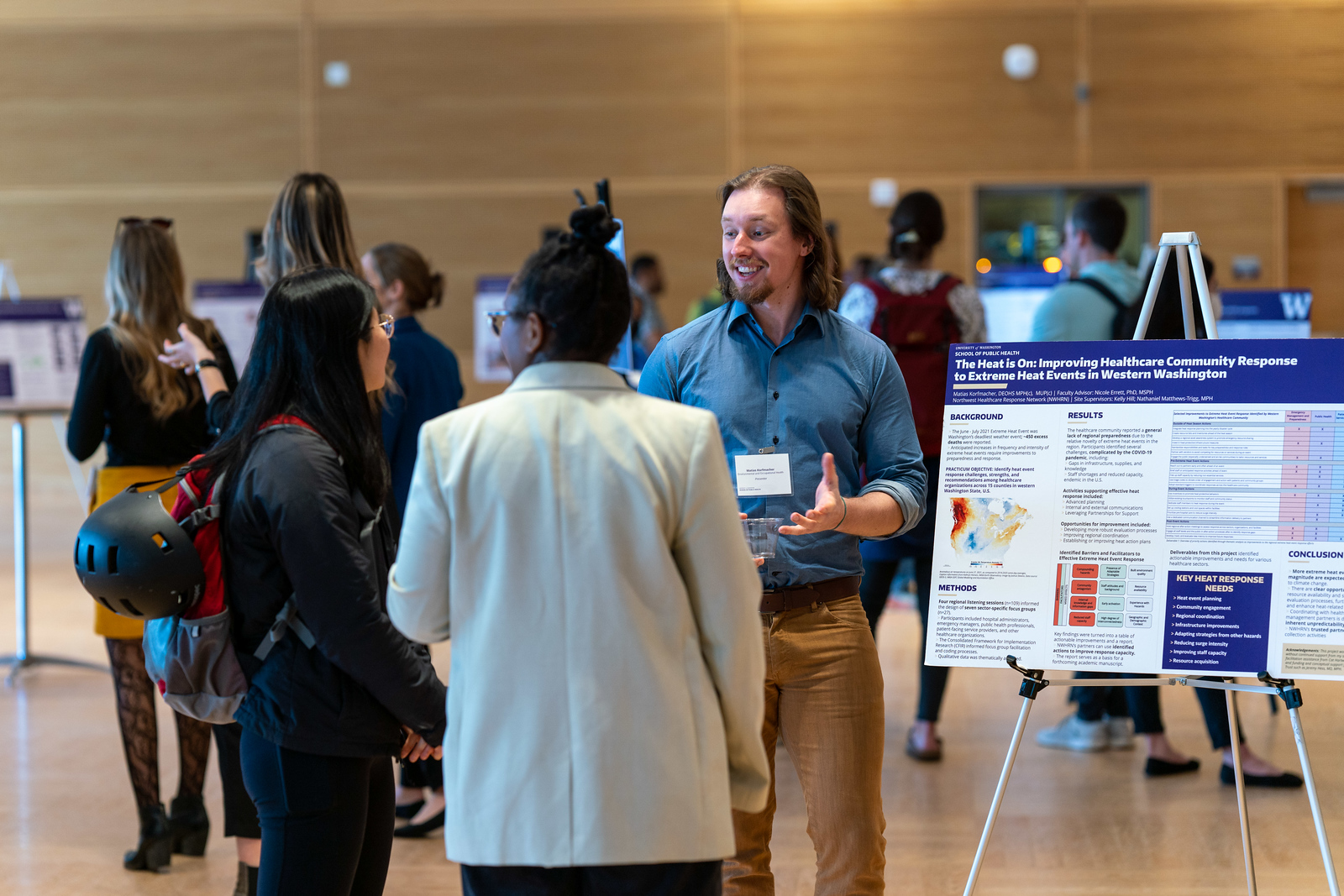
Our 24th annual MPH Practicum Symposium was in-person for the first time in two years!
Over the last year, MPH students have worked alongside public health practitioners to address some of the most pressing public health challenges of our time, including the COVID-19 pandemic. They've also applied their skills to improving access to health care for people experiencing homelessness, researching water and hygiene innovations to prevent disease in Ghana, and much more.
Over 70 of these graduate students showcased their practicum learning experiences. Most students presented in-person during the symposium held April 20 in the UW HUB Ballroom.
The annual MPH Practicum Symposium brings together students, faculty, practice partners, alumni, donors, policymakers, and more to celebrate students’ practice work, faculty mentorship, and community partnership. Save the date, and join us!
Symposium Presentations, Posters and Slides
View Presenter, Site, and Project Information
Alexis Thomas
alexist1@uw.edu
Washington COVID in Pregnancy Expanded Surveillance (CIPES)
PRACTICUM SITE: Washington State Department of Health - Zoonotic Diseases Program
SITE SUPERVISOR: Deborah Mbotha
DEPARTMENT: Epidemiology
FACULTY ADVISER: Daniel Enquobahrie
I am a second-year MPH student in Epidemiology, Maternal and Child Health track. My research interests include adverse pregnancy outcomes, nutrition, and social determinants of health. For my practicum project, I interned at the Washington State Department of Health to create a one-stop-shop toolkit for information, guidance, and recommendations on COVID-19 for the care of pregnant people and newborns. This toolkit targeted pregnant people, their friends and families, and healthcare workers. I also created and presented on structural biases and racism and how they have affected pregnant people during the COVID-19 pandemic. My practicum experience taught me how to conduct a thorough literature review of peer-reviewed and grey literature, which will assist me throughout my career in public health research. Outside of school and work, I enjoying cooking and spending time with family and friends.
Emily Nguyen
emilyttn@uw.edu
Recruitment and Outreach to Vulnerable and Underserved Populations in Washington (WA) State for the WA Maternal Mental Health Access (MaMHA) program
PRACTICUM SITE: UW - Psychiatry & Behavioral Sciences
SITE SUPERVISOR: Mindy Vredevoogd
DEPARTMENT: Global Health
FACULTY ADVISER: Ian Bennett
I am a second-year MPH candidate in the Department of Global Health with interests in community-based practice, mental health, and social determinants of health. For my practicum, I worked with the MaMHA program, a program through the Washington State Department of Health (DOH) that aims to train and support members of WA primary care clinics to decrease perinatal suicide risk and accidental opioid overdose. My role was to connect and introduce providers of various vulnerable and underserved populations in WA to the program. This work involved identifying and mapping populations of focus, identifying perinatal service providers and community advocacy groups, and outreach communication with identified providers and groups. Through this experience, I gained skills in community outreach and experience collaborating on public health program development that will contribute to improving my practice as a future public health professional.
Hanna Schlaack
schlaack@uw.edu
Supporting Healthy Communities through the Teen Pregnancy Project with the Washington Department of Health
PRACTICUM SITE: Washington State Department of Health-- Office of Family & Community Health Improvement
SITE SUPERVISOR: Bradley Klos
DEPARTMENT: Epidemiology
FACULTY ADVISER: Daniel Enquobahrie
I am a second-year MPH candidate studying Epidemiology with interests in maternal and child health. For my practicum, I worked with the Office of Family and Community Health at the Washington Department of Health (DOH), learning from epidemiologists who work in the Evaluation Unit. I worked with the lead evaluator for the Teen Pregnancy Prevention Project (TPPP), which addresses priority areas of the Washington State Plan for Health Communities by awarding grants to support the development of programs aimed at increasing reproductive and sexual health knowledge among youth, reducing rates of teen pregnancy. During my time working with the TPPP, I developed a tool that will help community partners evaluate interventions they have developed and produced a report using PRAMS datato help guide future program development. I am grateful to have had the opportunity to learn from a diverse group of community partners and experience working in public health at the state level.
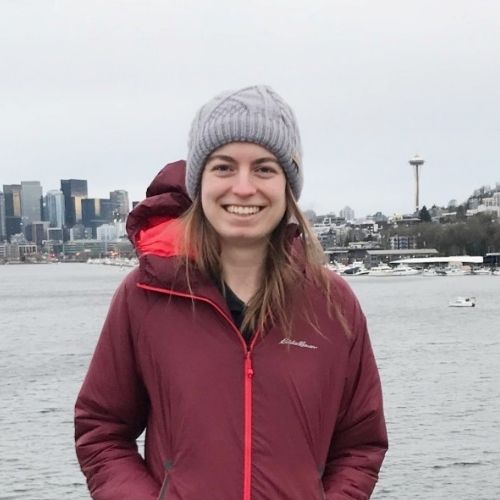
Ruby Lucas
rlucas2@uw.edu
Telehealth Utilization Among Transgender and Gender Diverse Adolescents: Assessment of Seattle Children’s Gender Clinic Telehealth Visits
PRACTICUM SITE: Seattle Children’s Hospital - Gender Clinic
SITE SUPERVISOR: Gina Sequeria
DEPARTMENT: Epidemiology - Maternal & Child Health
FACULTY ADVISER: Daniel Enquobahrie
I am interested in community-engaged and mixed-methods research, sexual health, mental health, access to care, and health disparities among transgender and gender diverse (TGD) and Black, Indigenous, People of Color (BIPOC) adolescent and young adult communities. The Seattle Children’s Gender Clinic (SCGC) is a multidisciplinary pediatric gender clinic serving TGD adolescents in King County. The expansion of telehealth services during the COVID-19 pandemic has allowed for continued access to care for many patients, but little is known about whether it has removed or exacerbated existing barriers in access to gender-affirming care for TGD youth. My practicum project helped to understand whether demographic characteristics of the TGD patient population receiving care in the clinic changed once telehealth services became available beginning in March 2020. I look forward to my continued collaboration with SCGC on future projects.

Sarah Wozniak
swozniak@uw.edu
Telehealth and Access to Care for Young Adults Experiencing Homelessness During the COVID-19 Pandemic and Beyond
PRACTICUM SITE: UW Youth Clinic
SITE SUPERVISOR: Do-Quyen Pham
DEPARTMENT: Global Health
FACULTY ADVISER: Stephanie Farquhar
I am a second-year MPH candidate in Global Health (Health Metrics and Evaluation Track), and I also work as a Post-Bachelor Fellow at IHME. For my practicum, I was excited to work with Dr. Pham and the UW Youth Clinic to explore the healthcare needs of young adults experiencing homelessness (YAEH). During the first stage of the project, I surveyed YAEH at the ROOTS Young Adult Shelter and the UW Resource Fair on their health needs, healthcare access barriers, and perceptions of telehealth. For the second stage, we conducted focus groups to delve into the potential for telehealth to fill healthcare gaps for YAEH during the COVID-19 pandemic. I am grateful for the opportunity to learn from the UW Youth Clinic team and all of our project’s participants. Outside of work and school, I enjoy reading fiction and short stories and spending time in nature.
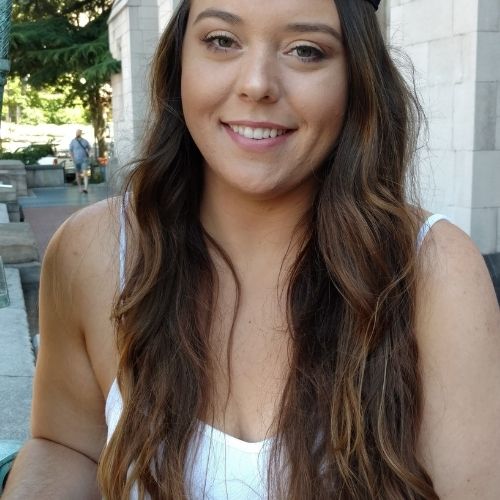
Holly Grimm
hollyg3@uw.edu
A Response Toolkit for Addressing Childhood Social Determinants of Health During Primary Care Visits
PRACTICUM SITE: University of Washington - Department of Pediatrics
SITE SUPERVISOR: Esther Chung
DEPARTMENT: Health Systems and Population Health
FACULTY ADVISER: Donna Denno
I am a second-year MPH student in Health Systems, the Maternal and Child Health track. My interests include implementation science, maternal and child health, addressing health disparities, and using data to drive change through a health equity lens. For my practicum, I worked with the University of Washington (UW) Division of General Pediatrics to develop Seattle CAP4Kids; a centralized web-based resource platform that will be used by clinic trainees, faculty, and non-faculty providers at UW and affiliated clinics as a tool to equitably address social determinants of health (SDoH) affecting children and their families. Specifically, I identified high impact resources that address prevalent SDoH in the Seattle metropolitan area, developed the content for the Seattle CAP4Kids website including printable resource forms, and developed a monitoring and evaluation plan. I am grateful to have had the opportunity to work with the UW Division of General Pediatrics to develop Seattle CAP4Kids as a centralized tool to address SDoH in our community.
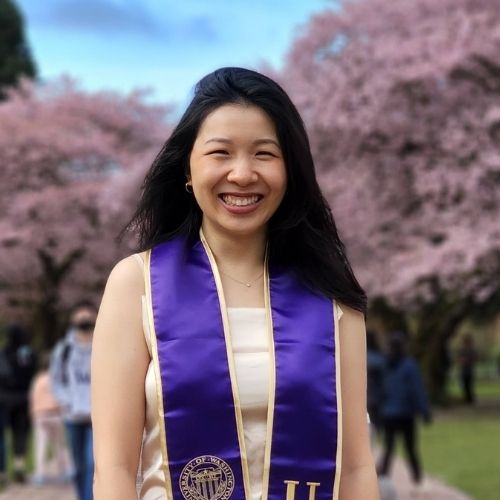
Sunny Wang
wangsun@uw.edu
Barriers to Telepsychiatry Care in Perinatal Women
PRACTICUM SITE: University of Washington Department of Psychiatry and Behavioral Sciences, Maternal-Child Mental Health (MCMH) Program
SITE SUPERVISOR: Jamie Adachi
DEPARTMENT: Health Systems and Population Health
FACULTY ADVISER: Daniel Enquobahrie
I am a second-year MPH candidate in Health Systems and Population Health, under the Health Systems and Policy track. I am an international student from Canada with an interest in the mental, sexual, and reproductive health of women and children. For my practicum, I conducted qualitative research on barriers preventing perinatal telepsychiatry service access, which were expanded in response to increased maternal mental health concerns during the COVID-19 pandemic. Along with my practicum partner (Anna Howard) and MCMH student assistant (Alexa Yadama), I produced literature reviews, created interview guides, conducted patient interviews, and coded and analyzed transcripts. Our team is now in the process of submitting a research manuscript on this project for publication.
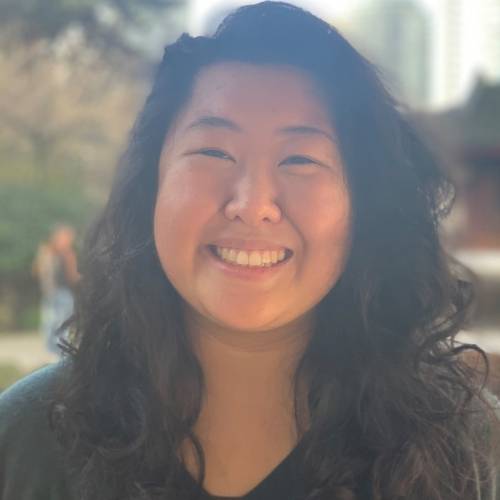
Alene Chang
archang@uw.edu
Evaluating Differences in Partner Services Outcomes for Men Who Have Sex with Men Diagnosed with Syphilis in King County
PRACTICUM SITE: Public Health – Seattle & King County Sexual Health Clinic, Harborview Medical Center
SITE SUPERVISOR: Matthew Golden
DEPARTMENT: Public Health Genetics
FACULTY ADVISER: Anna Mastroianni
I am a second-year MPH candidate studying Public Health Genetics with interests in the intersection of disease and environment, and leveraging data analysis tools to interrogate social issues. For my practicum, I worked with Seattle & King County Public Health and the Public Health Sexual Health Cllnic at Harborview to assess their partner services program in men who have sex with men (MSM). For this project, I worked with disease intervention specialists to assess the impact of partner services on the MSM community and disease transmission. I designed a program evaluation and assisted in deploying a REDCap survey and performing interviews and outreach. This work is still in-progress and I am working on data analysis and results for future publication that will be made accessible to those who have been diagnosed with syphilis and those working with vulnerable populations. Previously, I worked with community health clinics to deploy free and accessible sexual health services. I hope to continue that work as a public health practitioner, partnering with marginalized communities and improving access to healthcare for all.
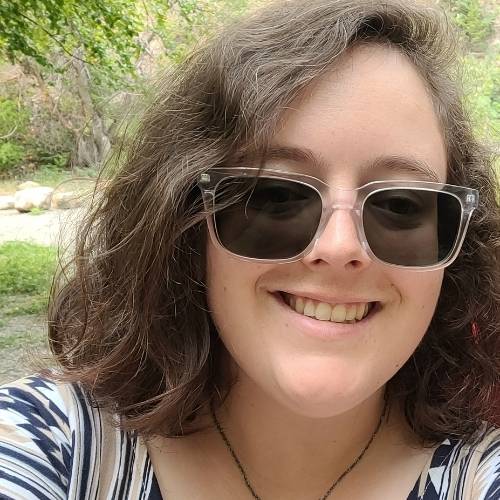
Antoinette (Annie) Vreeke
av46@uw.edu
COVID-19 Travelers' Health
PRACTICUM SITE: The Cannon Building-- Utah Department of Health
SITE SUPERVISOR: Jake Tant
DEPARTMENT: Health Systems & Population Health
FACULTY ADVISER: Jeffrey Harris
I am a second-year MPH candidate in the Health Systems and Population Health program. My interests include health disparities, Indigenous health. Community-based practice and research, and determinants of health. For my practicum, I worked with the Utah Department of Health COVID-19 Contact Tracing program in the new Travelers' Health program. My role was to help develop the new program, inform contacts of exposure, Do Not Board (DNB), developed a survey to assess Utah residents' attitudes towards travel, stakeholder assessment, and reaching out to Native Tribes in Utah. A bit about me outside of school, I enjoy photography, kayaking, camping, and spending what free time I have with my friends and family.
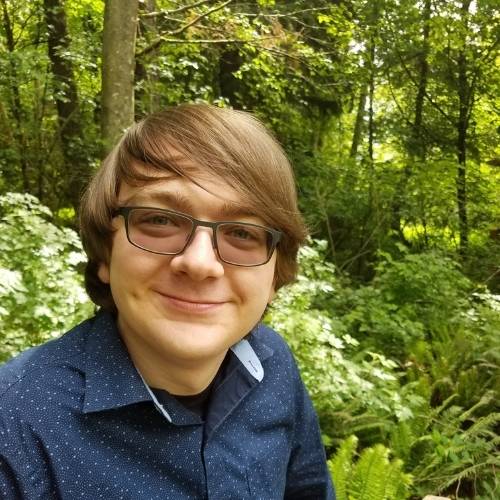 <
<
Jeffrey Taylor-Kantz
taylojef@uw.edu
SEAL Team Deployment: Mental and Behavioral Healthcare Data Analysis in Wenatchee Washington in partnership with Confluence Health and the Chelan-Douglas Health District
PRACTICUM SITE: Chelan-Douglas Health District
SITE SUPERVISOR: Kristen Hosey
DEPARTMENT: Epidemiology
FACULTY ADVISER: Janet Baseman
As a member of the SEAL Team, I spent eight weeks working in Wenatchee, WA with the Chelan-Douglas Health District (CDHD). I assisted a local hospital owned by Confluence Health in analyzing their patient records to better understand their service population’s mental and behavioral healthcare needs. I also supported the Health District in other efforts including case investigation during the surge of the COVID-19 Delta variant. I gained valuable quantitative analysis skills such as learning how to do certain analyses and make a dashboard in Microsoft Excel, which is the preferred tool for CDHD and some other local health jurisdictions. I also gained a breadth of knowledge and experience with the inner workings of the local health jurisdictions. Outside of work and school, I love to read, take walks in nature, and spend time with my family!
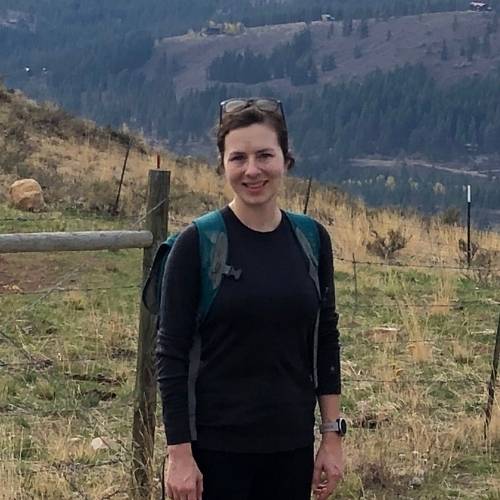
Kathleen Moloney
kmoloney@uw.edu
Assessing COVID-19 Vaccination Coverage and Hesitancy in Chelan County and Douglas County, Washington
PRACTICUM SITE: Chelan-Douglas Health District
SITE SUPERVISOR: Kristen Hosey
DEPARTMENT: Global Health
FACULTY ADVISER: Janet Baseman
I am a second-year Global Health MPH student and member of the UW Student Epidemic Action Leaders (SEAL) team. I am interested in studying the impacts of extreme events (such as pandemics and natural disasters) on communities, as well as how those impacts can be addressed and mitigated. Through the SEAL team, I found a practicum opportunity with the Chelan Douglas Health District, which involved deploying to Wenatchee, WA during Summer 2021. My practicum project focused on building the capacity of the Health District to assess COVID-19 vaccine hesitancy within Chelan and Douglas counties. Specifically, I built an updateable data dashboard to analyze the vaccination data provided by Washington DOH to the Health District. The dashboard identified the zip codes with the lowest vaccination coverage, as well as variance in vaccination coverage among different age and ethnic groups, allowing the Health District to prioritize the efforts of the COVID-19 vaccination outreach team.
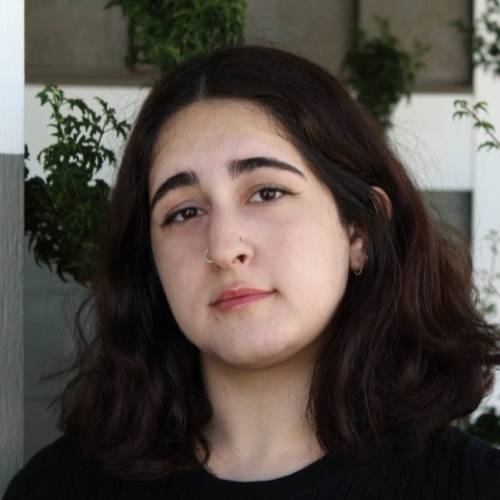
Lauren Sarkissian
lsark@uw.edu
Improving Foodborne Disease Communication Materials with the Washington Integrated Food Safety Center of Excellence
PRACTICUM SITE: Washington Integrated Food Safety Center of Excellence
SITE SUPERVISOR: Beth Melius
DEPARTMENT: Epidemiology
FACULTY ADVISER: Janet Baseman
Effective health communication keeps our communities safe. Public health information should be easy for the public to access and understand. I am interested in health communications for this reason. I am a second year MPH epidemiology student who completed my practicum with the Washington Integrated Food Safety Center of Excellence. I developed foodborne disease communications materials to be used by the Washington State Department of Health during outbreaks. I crafted press release templates and designed webpages so individuals could have easy, straightforward, and up to date information on foodborne disease outbreaks. I gained valuable skills from the team of epidemiologists and health communicators I collaborated with during this project and am grateful to have been given this opportunity! I look forward to a career in public health where I can continue to increase science accessibility and expand health equity. Outside of school and work, I am a house plant-hobbyist and visual artist who draws, collages, and does photography.
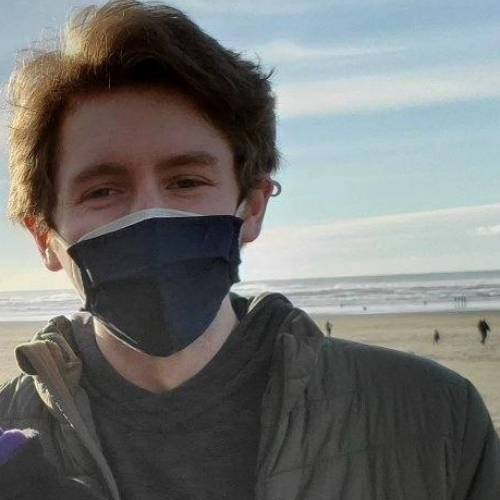
Logan Dearborn
dearbl@uw.edu
State Molecular Epidemiology Capacity and SARS-CoV-2 Variant Data Displays
PRACTICUM SITE: Washington State Department of Health - Office of Communicable Diseases Epidemiology
SITE SUPERVISOR: Krisandra Allen
DEPARTMENT: Epidemiology
FACULTY ADVISER: Alison Fohner
I am a second-year MPH student in epidemiology with an interest in environmental and molecular epidemiology. For my practicum, I worked with the Molecular Epidemiology Department at the Washington State Department of Health on a project regarding SARS-CoV-2 variant data display availability during the summer of 2021. I compiled the available displays and wrote a report summarizing the frequent components and information that was critical for visualizing the scope of variants within each state. I also created an RMarkdown file that allowed any person with access to R to create a US state or territory specific SARS-CoV-2 variant report, which served to increase public health worker capacity during pandemic response. This project was presented to the Council of State and Territorial Epidemiologists by my site supervisor, Krisandra Allen.
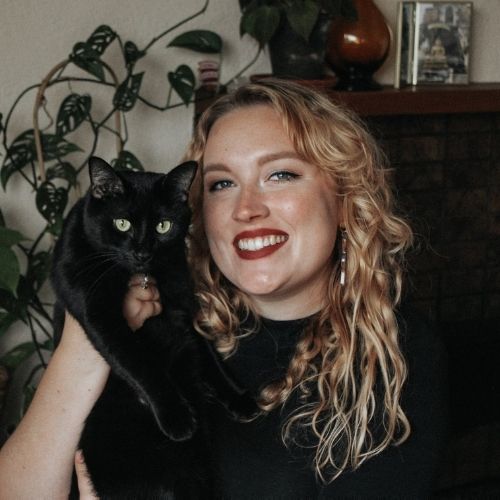
Madison Hollcroft
mrh38@uw.edu
Rise of Syphilis among Cisgender Women in King County
PRACTICUM SITE: Public Health Seattle-King County Sexual Health Clinic, Harborview Medical Center
SITE SUPERVISOR: Roxanne Kerani
DEPARTMENT: Epidemiology
FACULTY ADVISER: Christine Khosropour
I am a second year epidemiology student interested in STI prevention, social determinants of health, and health equity. For my practicum, I worked with the HIV/STD program at Public Health Seattle-King County to examine the rising rates of syphilis among cisgender women in King county. This project was of special interest because of the rising rates of syphilis among cisgender and heterosexual women, who have historically been a low-risk group for syphilis infection. Through my project, I abstracted case notes to expand Public Health Issue Management System (PHIMS) for patients that may not have been reached for interview by the public health department. I then conducted a descriptive analysis to determine factors that may be associated with syphilis infection in King County. This project allowed me to gain experience in public health practice in a health department setting and explore STI research as I aim to work in this field post-graduation. In my free time, I enjoy cooking, reading, playing with my cat, and making art such as painting or crotchet.
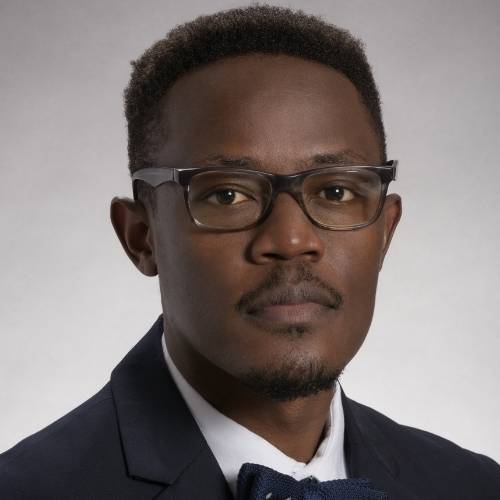
Mathias Lalika
mlalika@uw.edu
Innovative Water, Sanitation, and Hygiene (WASH) Interventions to Address Typhoid Burden in Ghana
PRACTICUM SITE: PATH-Typhoid Vaccine Acceleration Consortium (TyVAC)
SITE SUPERVISOR: Aziza Mwisongo
DEPARTMENT: Global Health
FACULTY ADVISER: Judd Walson
I am a second-year MPH candidate with the Department of Global Health. My interests include infectious diseases, chronic diseases, improving maternal and child health outcomes, and addressing health disparities. For my practicum, I helped move forward efforts to reduce the burden of typhoid in Ghana, Liberia, and Zimbabwe as part of the Typhoid Vaccine Acceleration Consortium (TyVAC) team at PATH—an international nonprofit global health organization based in Seattle. My role at PATH included helping design the survey questionnaire used to conduct a post-coverage cluster survey in Zimbabwe and developing innovative WASH interventions to help reduce the typhoid burden in Ghana. I love doing anything that brings people together, and I avidly listen to old soul music.

Niha Dhillon
nd98@uw.edu
Assess Community Outreach Strategies in Status Adjusters with Latent Tuberculosis Infection
PRACTICUM SITE: Seattle Tuberculosis Clinic at Harborview - TB Control Program
SITE SUPERVISOR: Katelynne Toren
DEPARTMENT: Epidemiology/Global Health
FACULTY ADVISER: Jennifer Balkus
I am a second-year MPH student studying Epidemiology with a concentration in Global Health. I was drawn to this field during an internship in Nairobi, Kenya where I worked with biostatisticians to assess needs and quality of life for Kenya women living with Metastatic Breast Cancer. After returning to Seattle, I began working at an NGO that served the immigrant and refugee families, which fueled my interest in working with this population. With this in mind, I worked with the Seattle Tuberculosis Clinic at Harborview for my practicum where I assessed individuals who were trying to get US citizenship (AKA "status adjusters") who had Latent Tuberculosis Infection (LBTI). I analyzed LTBI data from 2018-2021 to assess whether the strategies used by the clinic might be effective when doing broader LTBI community outreach. Through my practicum, I was able to meet and form connections with amazing public health professionals.

Olivia Dietz
olidietz@uw.edu
Case Classification Algorithms for Food-Borne Illnesses in Washington State
PRACTICUM SITE: Washington State Department of Health - Public Health Laboratory, Shoreline
SITE SUPERVISOR: Nicole Marshall
DEPARTMENT: Epidemiology
FACULTY ADVISER: Janet Baseman
I am a second-year MPH student with an interest in public health practice, infectious diseases, and outbreak response. For my practicum, I collaborated with the Washington Department of Health and the Northwest Center for Public Health Practice to design streamlined case classification algorithms for 13 notifiable foodborne illnesses. I used existing policy guidelines and documentation to create clear and consistent tools for use in local health jurisdictions for outbreak assessment and response. My practicum experience gave me the opportunity to learn about local interagency collaboration and the processes of public health communication and response.

Rachel Sanders
rms37@uw.edu
Evaluation of mHealth Pilot for Campylobacteriosis and Giardiasis Investigation
PRACTICUM SITE: Washington State Department of Health - Communicable Disease Epidemiology
SITE SUPERVISOR: Meelay Tellier
DEPARTMENT: Epidemiology
FACULTY ADVISER: Janet Baseman
My interests in infectious disease surveillance and outbreak epidemiology led me to complete my practicum with the WA State Department of Health and the WA Integrated Food Safety Center of Excellence. For my practicum, I worked to develop and evaluate the success of a mobile health (mHealth) tool to assist with public health investigation of reported Campylobacteriosis and Giardiasis cases. The aim of this pilot was to provide a web-based tool as an alternative option to traditional phone-based case investigation methods, with the goal of reducing staff burden and collecting high quality exposure data. My written evaluation of the mHealth tool described the impacts of using an online survey for case investigation and included recommendations for modifying and expanding the use of the tool in order to meet the needs of all local health jurisdictions across Washington.
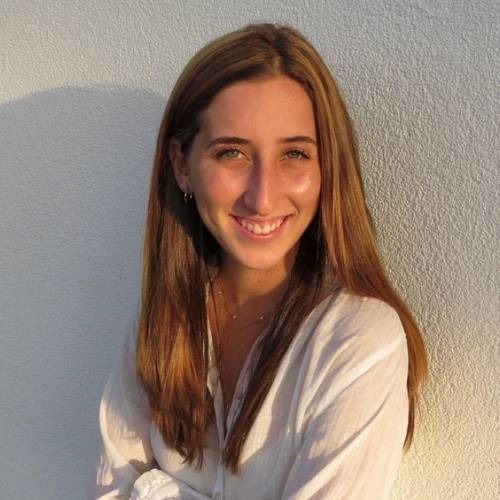
Stephanie Ann Buchbinder
steph18@uw.edu
Evaluation of Patient Experiences with a Novel Approach to STI testing and PrEP Delivery Among Pregnant Women in Kenya
PRACTICUM SITE: Global WACh - Global Center for Integrated Health of Women, Adolescents, and Children
SITE SUPERVISOR: Julia Dettinger
DEPARTMENT: Epidemiology
FACULTY ADVISER: Jillian Pintye
I am a second-year MPH student in the Department of Epidemiology. My primary interest is infectious disease, with a particular interest in sexually transmitted infections (STI) and foodborne illness. For my practicum, I worked with the PrEP in pregnancy team at Global WACh to conduct a formal evaluation of a point-of-care STI testing and EPT intervention implemented in Kenya. My role was to help lead the qualitative data analysis portion of the project and use the results to create a comprehensive evaluation of patient and provider experiences to be shared with stakeholders both locally and abroad.
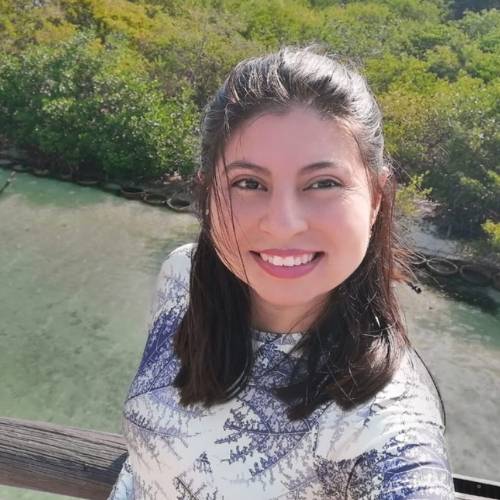
Yenny Fernanda Guzman Ruiz
yennygr@uw.edu
COVID-19 Forecasting Model Comparison
PRACTICUM SITE: Institute for Health Metrics and Evaluation
SITE SUPERVISOR: Emmanuela Gakidou
DEPARTMENT: Health Systems & Population Health
FACULTY ADVISER: Sarah Knerr
I am a second-year MPH student in Health Systems and Population Health. I grew up in Colombia, where I completed my undergraduate degree in Government and Public Affairs and a Medicine degree. Last year, I participated in the advisory team for the Colombian Ministry of health to manage the COVID-19 pandemic. I realized the evidence gap stakeholders faced addressing a pandemic, there were high levels of uncertainty and high opportunity cost with each feasible alternative. This led me to complete a COVID-19 centered practicum at IHME. I worked on the COVID-19 forecasting model comparison project. We made an in-depth evaluation of the universe of COVID-19 models that have been used to make forecasts throughout the pandemic. The project aims to advance our understanding of the attributes and performance of individual and ensemble models to improve the preparedness for ongoing and future pandemics.

Erin Chase
chasee2@uw.edu
Creation of Public-Facing Tools to Explain HIV Tracing Efforts in King County
PRACTICUM SITE: Public Health Seattle-King County-- Sexual Health Clinic, Harborview Medical Center
SITE SUPERVISOR: Roxanne Kerani
DEPARTMENT: Epidemiology
FACULTY ADVISER: Christine Khosropour
I am a second-year MPH-Epidemiology student with interests in applied epidemiology, mental health, and social determinants of health research. For my practicum, I worked with the HIV/STD Program at Public Health-Seattle & King County to develop informational tools explaining HIV Tracing Efforts in King County. HIV Tracing involves identifying where HIV transmission is occurring using molecular surveillance data so that Public Health staff may provide additional resources and support to people involved in HIV clusters. Public Health-Seattle & King County expressed a need to develop materials to better explain the HIV Tracing process, its data protections, and what can and cannot be learned when analyzing this data. I helped to create a list of FAQs with answers for the PHSKC website, written materials to support HIV Tracing outreach efforts, and analyzed themes from qualitative interviews conducted with people interviewed through the HIV Tracing process. In my free time, I enjoy hiking, backpacking, reading, and spending time with friends.

Eliza Ramsey
ramseyec@uw.edu
Developing an online survey tool for enteric disease interviewing
PRACTICUM SITE: Washington State Department of Health-- Communicable Disease Epidemiology
SITE SUPERVISOR: Nicole Marshall
DEPARTMENT: Epidemiology
FACULTY ADVISER: Janet Baseman
For my practicum project, I had the opportunity to weave together my experience as a student interviewer for the Washington State Department of Health with my interest in public health informatics and novel surveillance strategies. In partnership with another UW MPH student, a team of epidemiologists, and local health jurisdictions, we adapted a web-based survey for interviewing individuals with Giardia and Campylobacter. Then we implemented and evaluated the tool to make recommendations for future applications of survey-based notifiable disease investigations. I valued the opportunity to apply so many skills I had learned in the first year of the MPH curriculum – from technical coding and survey design to evaluation principles and communication skills. This project reinforced my professional interest in working for a local or state health department and introduced me to the cutest pathogen – Giardia (worth the image search)!
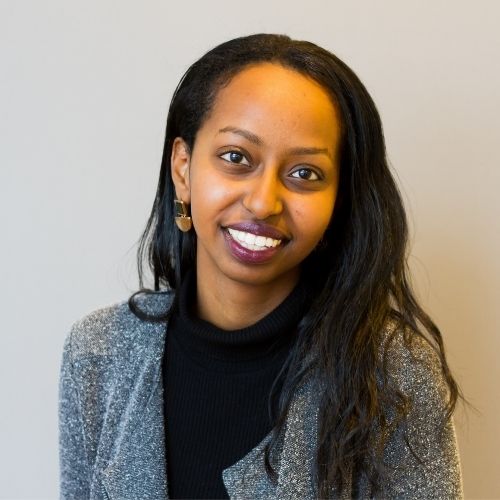
Lydia Haile
lhaile@uw.edu
Preparation of Evidence Briefs on Subnational Burden of Disease in Ethiopia
PRACTICUM SITE: Ethiopian Public Health Institute-- National Data Management Centre/Burden of Disease Unit
SITE SUPERVISOR: Awoke Temesgen
DEPARTMENT: Global Health
FACULTY ADVISER: Theo Vos
I am a second-year MPH student in the Global Health- Health Metrics and Evaluation track. I am interested in evidence translation, capacity-building, and diversity and equity in research. In collaboration with local stakeholders, I prepared evidence briefs on the subnational burden of disease for the National Data Management Center (NDMC) at the Ethiopian Public Health Institute, compiling relevant health metrics, analyzing their relevance to local health systems and programs, and standardizing estimates for comparison across surveillance systems. This information will be utilized to improve the completeness of reporting, indicator quality, and develop programs for intervention and the subnational level. I presented and discussed drafts with NDMC staff and other stakeholders during the revision process through routine feedback sessions. In compiling this information, I liaised with members of the NDMC to consider the best usage of this information for policy development and program implementation. I also presented to NDMC on analytical methods and health metrics methodology to contribute to knowledge sharing and capacity-building.

Erin Tabor
ertabor@uw.edu
One Health Clinic Model: Developing and Implementing a Protocol to Incorporate Human Mental Health and Animal Behavior Training
PRACTICUM SITE: Neighborcare Health
SITE SUPERVISOR: Katie Schneier
DEPARTMENT: Environmental and Occupational Health Sciences – One Health
FACULTY ADVISER: Peter Rabinowitz
I am a second year MPH candidate studying One Health in the Department Environmental and Occupational Health Sciences. My research interests are the human-animal bond and how it can be leveraged to improve human (and animal) health. For my practicum, I worked with Neighborcare Health on the development of a pilot study where animal behavior training classes are provided together with human mental health providers. Neighborcare Health is partnered with the University of Washington’s Center for One Health Research, and several other organizations, to provide a “One Health Clinic” where human medical services are provided alongside veterinary care for unhoused youth with companion animals and this project is an expansion of this model. My role was to conduct a background literature review and develop a written standard operating procedure for the study. It was exciting to be a part of this project, and the skills I gained will help me as I pursue my career goals of supporting the animal welfare field with a public health lens.
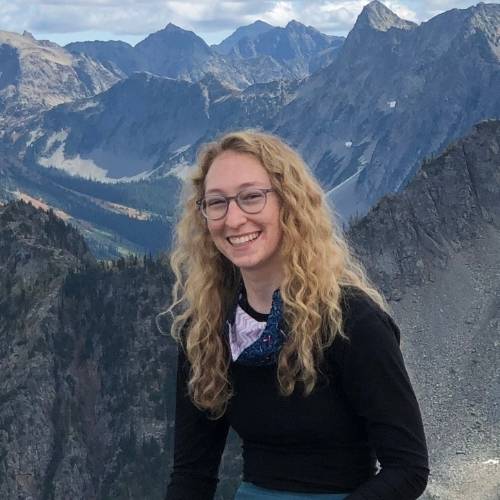
Hannah Fenelon
hfenelon@uw.edu
West Nile Virus Surveillance at the Washington State Department of Health
PRACTICUM SITE: Washington State Department of Health - Zoonotic Diseases Program
SITE SUPERVISOR: Mary Chan
DEPARTMENT: Epidemiology
FACULTY ADVISER: Peter Rabinowitz
I am a second year MPH student studying epidemiology with interests in zoonotic disease, vector-borne disease, and more broadly, One Health. I was fortunate enough to work with the Washington State Department of Health on their West Nile Virus surveillance team for the summer of 2021. I assisted in trapping mosquitoes weekly at two sites in King County and on data analysis for a 5-year surveillance report. This opportunity allowed me to participate in a majority of the data pipeline, from collection to cleaning to analysis. Working with the epidemiologists on this team reaffirmed my desire to work on zoonotic disease surveillance at a local or state level. In my free time, you can often find me with a green vested Guide Dog Puppy in Training at my side as we work to prepare him for his guide dog college days.
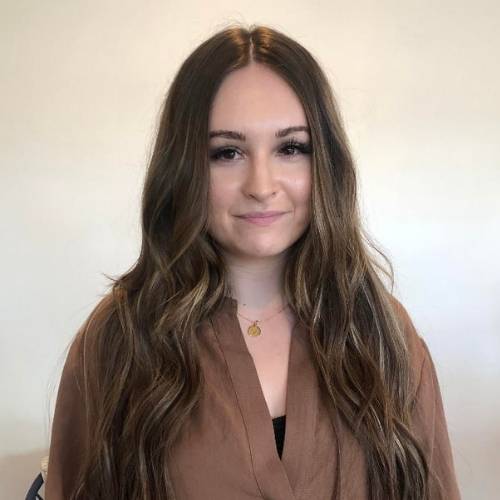
Inna Antonchuk
antoni@uw.edu
Analysis of OSHA Noise-Related Inspections from 2015-2019 to Characterize Abatements Required When Measured Noise Levels Exceeded 90 dB
PRACTICUM SITE: Occupational Safety and Health Administration Office of Medicine & Nursing
SITE SUPERVISOR: Virginia Weaver
DEPARTMENT: Environmental & Occupational Health Sciences
FACULTY ADVISER: Arnold de Castro
I am a registered nurse and MPH Occupational & Environmental Health Candidate. I am also in the School of Nursing and Northwest Center for Occupational Health & Safety (NWCOHS) as a Graduate Certificate Candidate in the Advanced Practice Environmental & Occupational Health Program. I was chosen for OSHA's Graduate Nurse Internship Program for the summer of 2021. In this practicum, I analyzed OSHA noise-related inspections to characterize controls/actions OSHA required of employers when measured noise levels exceeded the permissible exposure limit (PEL). This information was used to support a revised economic analysis of the impacts of occupational noise exposure and related permanent hearing loss. It also provided insight into how OSHA regulatory activities impact employers and workplaces nationwide. It was fascinating to intern with a federal agency like OSHA and learn about policy-making and enforcement in occupational health and safety. It was also cool to see how my nursing background could be applied to protect workers on a policy-level.
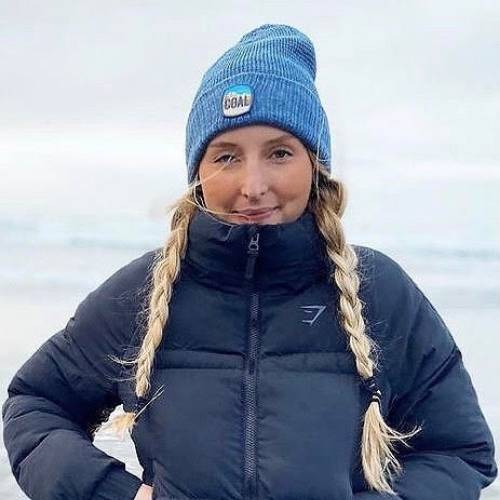
Ivy Terry
ivyt2@uw.edu
One Health Strategic Plan: Tree Kangaroo Conservation Program within the Yopno-Uruwa-Som Landscape PRACTICUM SITE: Tree Kangaroo Conservation Project
PRACTICUM SITE: Tree Kangaroo Conservation Project
SITE SUPERVISOR: Lisa Dabek
DEPARTMENT: Environmental & Occupational Health Sciences
FACULTY ADVISER: Peter Rabinowitz
I am a second-year MPH One Health candidate interested in community-based practice and research with a focus on zoonotic disease and global environmental health. For my practicum, I co-led the development of a One Health Strategic plan for the Tree Kangaroo Conservation Program within the Yopno-Uruwa-Som Landscape (YUS) in Papua New Guinea with the Woodland Park Zoo’s Senior Conservation Scientist, Dr. Lisa Dabek, and the Director of the UW Center for One Health Research, Dr. Peter Rabinowitz. Specifically, I developed intervention goals, detailed strategies, a work plan timeline, and logic model for proposed intervention to improve One Health strategies in YUS. This project represents an intervention on a multi-level scale that prioritizes indigenous knowledge in its implementation. I hope to continue collaborating with the Tree Kangaroo Conservation Program and my local YUS collaborators in the future as I expand upon my international work.
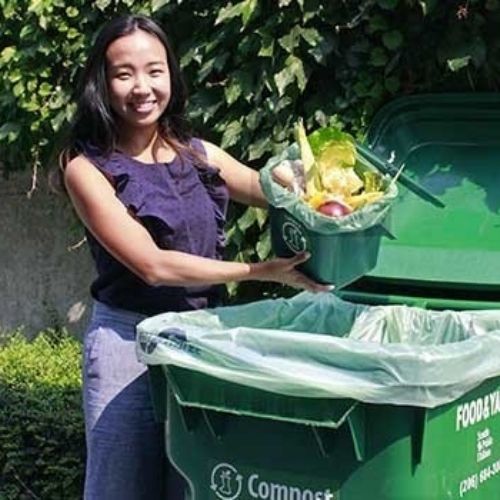
Joycelyn Chui
wtjc@uw.edu
Restaurant 2 Garden – a Community-based Food Waste Composting Pilot Project
PRACTICUM SITE: InterIm Community Development Association (InterIm CDA) - Danny Woo Community Garden
SITE SUPERVISOR: Elizabeth Baskerville
DEPARTMENT: Environmental & Occupational Health Sciences
FACULTY ADVISER: Tania Busch Isaksen
I am a second-year MPH candidate studying Environmental and Occupational Health Sciences with an interest in developing upstream climate justice-oriented solutions that address the intricacies between science, community, and policy. For my practicum, I worked with Danny Woo Community Garden to launch the Restaurant 2 Garden project. The project was designed based on the Just Transition framework to pilot a decentralized, hyperlocal community composting system that composts local restaurant food waste into nutritious fertilizer. The goal is to eliminate the need to transport food waste out of the neighborhood, which can lead to building capacity within the community in the long run. My role was to conduct a literature review, engage with stakeholders, and assist with project management. This experience was an amazing opportunity for me to practice science translation into actionable measures in a resource-limited setting, an applicable skill for my future career.
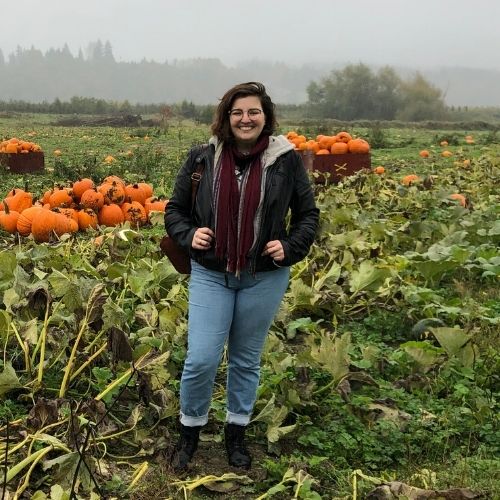
Kathryn Burr
kburr@uw.edu
Instructional Videos and Infographics for Pet Reptile and Backyard Poultry Sample Collection in Salmonella Outbreak Investigations in partnership with Washington State Department of Health and Woodland Park Zoo
PRACTICUM SITE: Washington State Department of Health - Washington Integrated Food Safety Center of Excellence
SITE SUPERVISOR: Soyeon Lippman
DEPARTMENT: Environmental & Occupational Health Sciences
FACULTY ADVISER: Peter Rabinowitz
One Health is an interdisciplinary field dedicated to considering public health issues from a perspective incorporating animal, human, and environmental health systems. My background is in veterinary medicine, and I previously graduated with my Doctorate of Veterinary Medicine in 2014. For my practicum, I helped to develop training materials for the Washington Integrated Food Safety Center of Excellence (WA COE) at Washington State Department of Health. In a 2021 survey five of the six state health departments that WA COE assists in the western region identified animal and environmental sampling procedures as a knowledge gap among their staff. Every year the CDC identifies nationwide Salmonella outbreaks that are linked back to pet reptiles and backyard poultry flocks. Safe and effective sampling of these pets and their environments is essential to surveillance and response to these outbreaks. In order to help fill this knowledge gap within state and local health jurisdictions I worked with WA COE and Woodland Park Zoo to produce several instructional videos and infographics on this type of sampling. This project was a wonderful experience, and the perfect fit for my background and professional development goals.
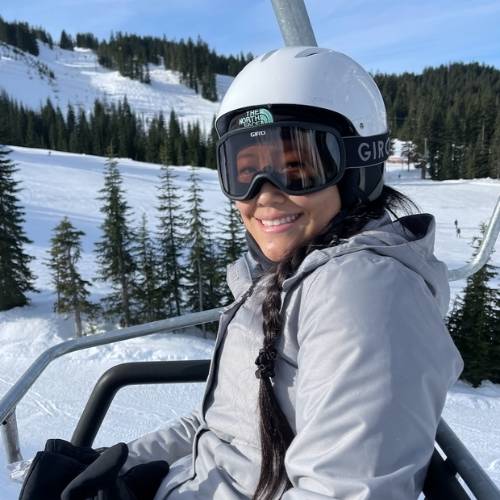
Amanda Shi
ashi16@uw.edu
Formative Evaluation of Seattle Fire Department’s Health One Program
PRACTICUM SITE: Seattle Fire Department-- Medic One (Health One)
SITE SUPERVISOR: Jon Ehrenfeld
DEPARTMENT: Health Systems and Population Health
FACULTY ADVISER: Hendrika Meischke
I am a dual MPH and MPA candidate who is passionate about using community co-design and equity-based decision making to address housing, mental, and behavioral health needs in King County. My experiences focus on working with community-based organizations, on diversity, equity, & inclusion efforts, and in frontline service positions with people experiencing homelessness. For my practicum, I worked with Seattle Fire Department’s mobile integrated health unit, Health One, on a formative evaluation of outreach, resource utilization, and dispatch services. Health One’s main goal is to address the needs of low-acuity utilizers of EMS/9-1-1 services to provide proper treatment and for emergency department diversion of clients. My role was to address informational needs for future expansion through a qualitative review of case notes from runs, field observation on ride-alongs with the crew, and interviews with members of the team. The skills and community-engaged work I was able to observe supports my future goals of working in human services on addressing systems fragmentation. In my free time, I enjoy hot yoga, ballet, soccer, and skiing.
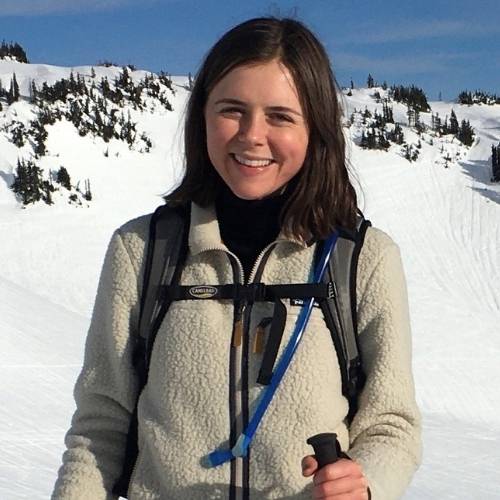
Azalea Thomson
azaleat@uw.edu
Communicating Research Findings in US Health Spending for Policy Translation
PRACTICUM SITE: Institute for Health Metrics and Evaluation
SITE SUPERVISOR: Joe Dieleman
DEPARTMENT: Global Health
FACULTY ADVISER: Nicholas Kassebaum
I am a second-year MPH candidate in the Global Health, Health Metrics and Evaluation track. I work concurrently with the Institute for Health Metrics and Evaluation (IHME) where I model global estimates of disease burden due to hemoglobinopathies. I care about global health research as it relates to narrowing health inequities and disrupting systemic issues. For my practicum, I joined the Disease Expenditure (DEX) research team at IHME which aims to strengthen estimates linking financial resources and health outcomes in the U.S. I collaborated with the DEX team to develop two projects: a blog post highlighting recent DEX research on U.S. health spending and utilization by race and ethnicity and an interactive data visualization tool on the value of U.S. state health systems. Through these projects, I addressed problems which frequently occur in public health research—that of communicating key results that provide opportunity for decision-makers to enact change. In my free time I enjoy being outdoors, dance, ceramics, and reading short stories.
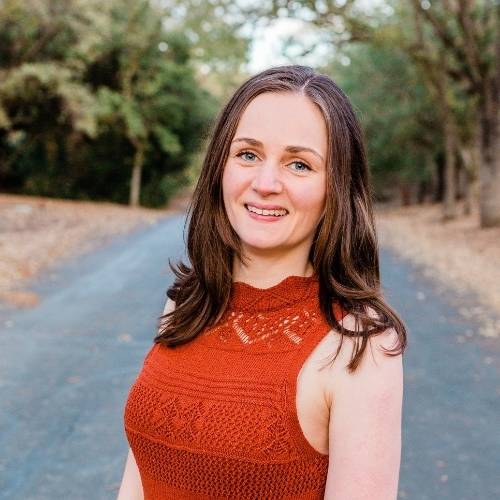
Emilie Maddison
ermadd@uw.edu
Jury Diversity: A Survey of Washington State Trial Courts and Analysis of Court Demographic Data Collection and Juror Accommodations
PRACTICUM SITE: Washington State Administrative Office of the Courts
SITE SUPERVISOR: Rebecca Glasgow
DEPARTMENT: Global Health
FACULTY ADVISER: Sierra Rotakhina
I am an MPH student in Global Health - Health Metrics and Evaluation, and have spent the last 5 years working for IHME as a data analyst and Post-Bachelor Fellow. In this time, I have researched the disease burden of Tuberculosis, and currently work on analyzing health financing for topics such as development assistance, education, and Malaria. I love working at the intersection of public health, epidemiology, and data science. For my practicum, I worked on the Gender Justice Study within the Washington State Supreme Court Gender and Justice Commission. My project focused on analyzing the results from a Washington Trial Court Survey on demographic data collection, using both quantitative and qualitative methods. I worked with Rhaelynn Givens, Sierra Rotakhina and Judge Glasgow on the project, which was presented to the Gender and Justice Commission. It was wonderful exposure to the role of public health research in a non-health setting, and I look forward to using what I learned from this project in my career moving forward.
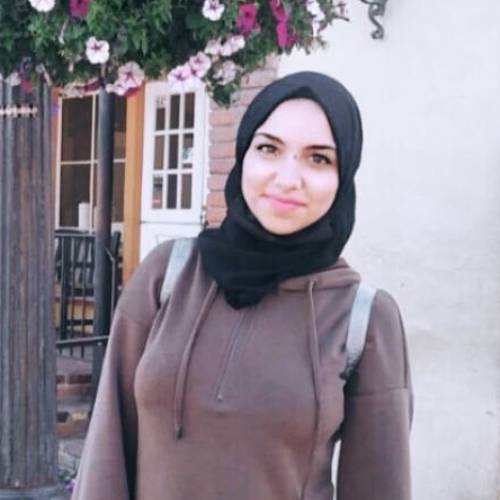
Fatima Al-Shimari
fatima97@uw.edu
Characterizing Burkitt’s Lymphoma Fund for Africa’s Impact on Reducing the Burden of Childhood Cancers in Sub-Saharan Africa
PRACTICUM SITE: Burkitt's Lymphoma Fund for Africa
SITE SUPERVISOR: Kerry Sturgill
DEPARTMENT: Global Health
FACULTY ADVISER: Susan Graham
I am a second year MPH student in Global Health and my practicum experience is with Burkitt’s Lymphoma Fund for Africa (BLFA). I began working as a student researcher with BLFA and conducted a series of quantitative data analyses with them during December of 2020. I loved collaborating with the site manager, Kerry Sturgill, and appreciated what the organization did. BLFA decolonizes the international NGO space by highlighting the narratives of those they are serving and by allowing their partners in LMICs to have full autonomy in addressing gaps in healthcare services. For my practicum, I proposed to help the organization drive more donor-funding by synthesizing data from their projects and creating a data dashboard and report to showcase the impact of their efforts. Throughout the project, I worked closely with a variety of experts who each had a unique contribution to the group, and attended meetings regularly to engage in their brainstorming sessions. Outside of school, I love spending time in bookstores and Boba tea shops.
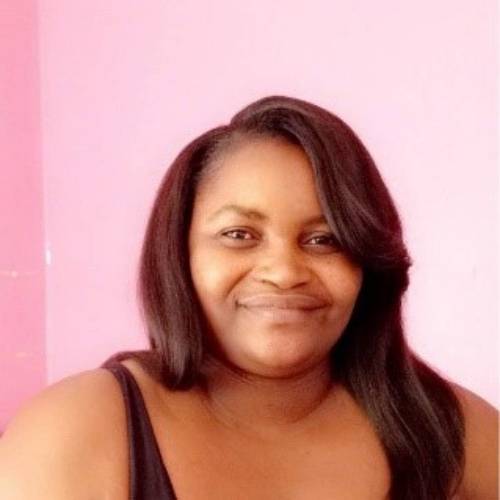
Frieda Theofelus
friedt2@uw.edu
Data quality improvement to correct for misclassification of patients as interrupters of treatment at three facilities in Windhoek, Namibia
PRACTICUM SITE: UW International Training and Education Center for Health (I-TECH)
SITE SUPERVISOR: Mark Shepard
DEPARTMENT: Global Health
FACULTY ADVISER: Gabrielle O’Malley
I am a second-year MPH candidate in the Global Health in Health Metrics and Evaluation. With experience in statistics field in sampling, field work and data collection, I decided to pursue my new career in public health. I completed my practicum in my home country Namibia where I worked as a M & E at ITECH Namibia supporting data quality improvement project and improving data quality in two, unlinked data bases: Quantum ePMS, the HIV electronic patient management system, and the electronic dispensing tool (EDT), a pharmaceutical database) of the Ministry of Health and Social Services (MoHSS) in Namibia. I developed an understanding of the primary causes of gaps in data capture, produced a change intervention, and improved the data flow and data capture. My practicum experience helped to shape my understanding in health problems globally. I love dancing, spending time with my family.
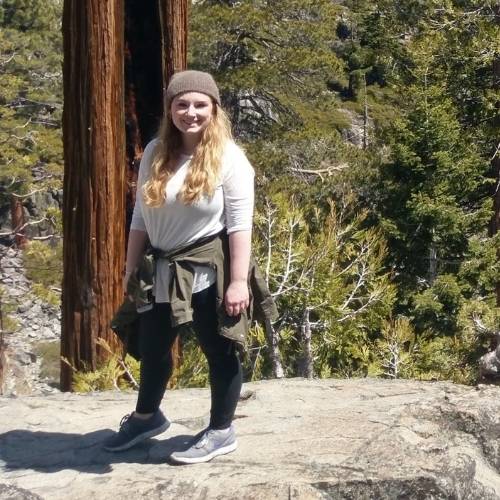
Kali Curtis
kalic@uw.edu
Charity Care Policy & Medical Debt Collections in Washington State
PRACTICUM SITE: Northwest Health Law Advocates (NoHLA)
SITE SUPERVISOR: Emily Brice
DEPARTMENT: Health Systems and Population Health
FACULTY ADVISER: Amy Hagopian
I am a first year MPH candidate in Health Systems and Population, Health Systems & Policy concentration. For my practicum, I worked with Northwest Health Law Advocates (NoHLA) and an affiliated consumer law attorney to investigate charity care policy and medical debt collection practices in Washington State. I gathered qualitative data from Washington State residents who had been sued for medical debt to learn if they were informed about the charity care program. My findings and resulting report shared with NoHLA and the Attorney General’s Office was used to support passing HB 1616, which aims to increase the income eligibility limit for charity care and standardize the income level for charity care eligibility across Washington State hospitals. A secondary goal was for my findings to support advocacy efforts for improving enforcement of charity care policy in Washington State.
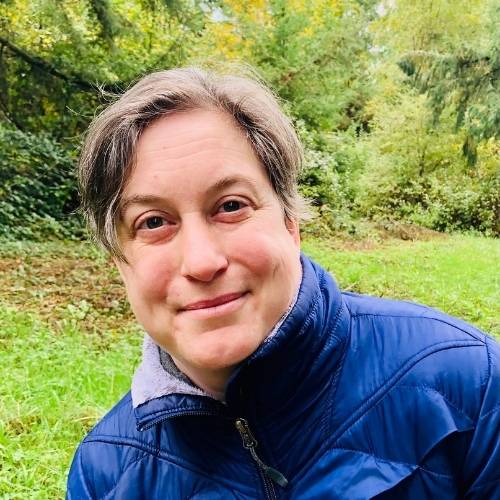
Kristine King
kmking@uw.edu
Genetic Resource, Education, and Advocacy Tool (GREAT) for Family Advocacy Organizations
PRACTICUM SITE: Hawaii Department of Health - Genomics Program
SITE SUPERVISOR: Sylvia Mann
DEPARTMENT: Public Health Genetics
FACULTY ADVISER: Deborah Bowen
With a background as an MD in clinical medical genetics, I am interested in strategies to expand genetic services to a wider spectrum of the population. For my practicum, I worked with the State of Hawaii Department of Health Genomics Program and the Western States Regional Genetics Network (WSRGN) to develop new content for “GREAT”, an online resource for state Family Advocacy Organizations. In addition, I curated Washington state-specific genetic disorder internet resources for inclusion in GREAT and learned about the role of family advocates, the support organizations they partner with, as well as the types of information most useful for non-professionals and end users within the genetics realm.
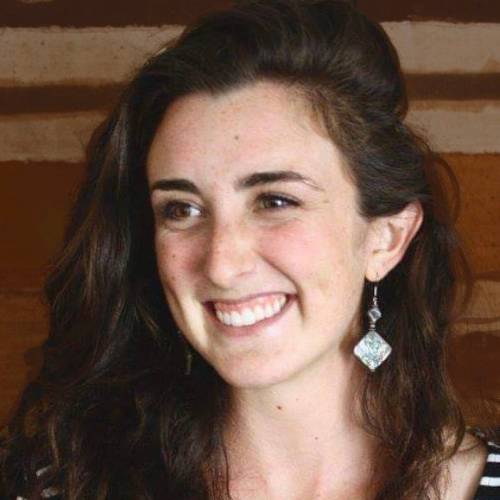
Madeline (Addy) Borges
mcborges@gmail.com
Medication to Treat Opioid Use Disorder in Washington State Jails
PRACTICUM SITE: Washington Association of Sheriffs & Police Chiefs
SITE SUPERVISOR: Marc Stern
DEPARTMENT: Global Health
FACULTY ADVISER: Stephen Gloyd
I am a second-year MPH candidate in the Department of Global Health with interests in addressing individual- and community-level harms of carceral systems, and improving health and social services to support individual dignity. My practicum involved a survey of the 58 jails in Washington State to ascertain the level of Medications for Opioid Use Disorder (MOUD) care provided, the barriers to complete care access for incarcerated patients, and estimates of cost to remove barriers at each jail. Findings from this analysis will be compiled into a report to (1) directly inform Washington State Healthcare Authority of the current gaps in services as it develops the jail portion of its substance use disorder plan under the Roadmap to Recovery grant, and (2) directly inform the Washington State Association of Sheriffs and Police Chiefs about what funds should be allocated to which jails to close gaps in services. Outside of work and school, I enjoy cooking, being outside, building community, and anything creative.
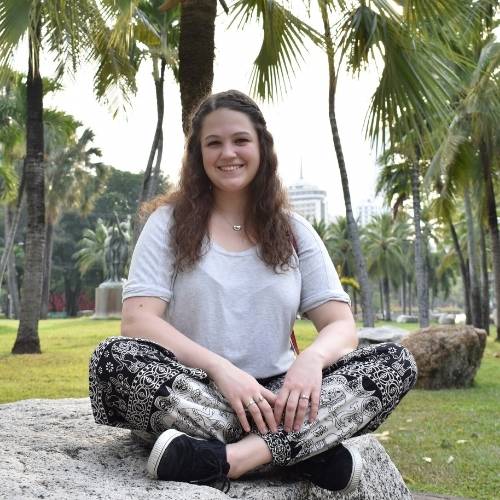
Sarah Hicks
smd722@uw.edu
Understanding Healthcare Services Distribution among King County Community-Based Organizations Serving Immigrant and Refugee Populations
PRACTICUM SITE: Pacific Hospital Preservation and Development Authority
SITE SUPERVISOR: John Kim
DEPARTMENT: Epidemiology
FACULTY ADVISER: Anjum Hajat
I am a second-year MPH student in the Epidemiology department, and I am interested in HIV prevention and treatment as well as healthcare equity and access, particularly among immigrants and refugees. For my practicum, I partnered with the Pacific Hospital Preservation & Development Authority to better understand what gaps and overlaps exist in community-based organization (CBO) healthcare provision. My role was to create and distribute a survey to the CBOs, make recommendations to funding agencies about how to prioritize equitable program funding, and investigate opportunities for CBO collaboration on future healthcare initiatives. In my free time, I enjoy baking, crafting, reading, and exploring Seattle parks with my husband and our dog.
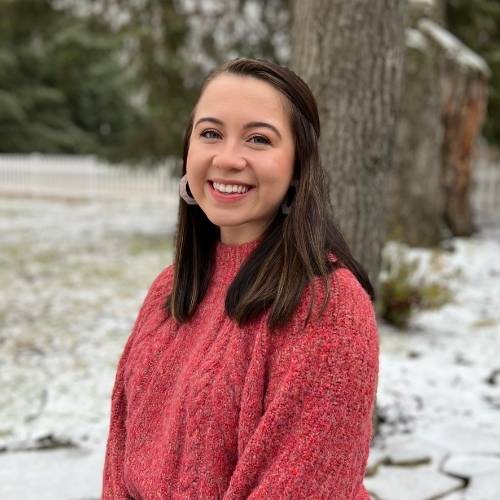
Sierra Teadt
smteadt@uw.edu
Qualitative Interviews with People Who Use Methamphetamine at Washington State Syringe Services Programs
PRACTICUM SITE: UW Alcohol and Drug Abuse Institute
SITE SUPERVISOR: Allison Newman
DEPARTMENT: Health Systems and Population Health
FACULTY ADVISER: Caleb Banta-Green
I am a second-year MPH student in Health Systems and Population Health. Both personally and professionally, I am passionate about harm reduction and substance use. This passion led me to my practicum opportunity with the University of Washington Addictions, Drug & Alcohol Institute (ADAI). For my practicum, I had the privilege of interviewing people who use methamphetamine at syringe services programs in Washington State. The purpose of these interviews was to better understand people's interest in reducing or stopping their methamphetamine use, as well as the barriers and facilitators to doing so to ultimately inform future services. The knowledge and skills I gained from this experience helped me land a career in this field as a behavioral health case manager at Integrated Services of Kalamazoo! Outside of work and school, I love to crochet, read historical fiction books, and spend time with rescue dog, Lulu.
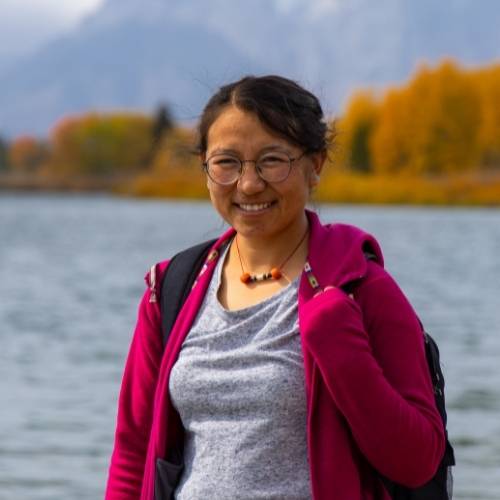
Tsering Wangmo (Wangmo Thapa)
wangmo@uw.edu
An Exploratory Need Assessment on Barriers and Facilitators of Health Care Access and Utilization among the Individual Experiencing Homelessness in Santa Fe, NM
PRACTICUM SITE: La Familia Medical Center - Health Care for Homeless Program
SITE SUPERVISOR: Virginia C Robertson
DEPARTMENT: Global Health
FACULTY ADVISER: Wendy Johnson
I am second-year MPH in Global Health candidate and Global WACh certificate student. I am passionate about making adequate, quality healthcare accessible to my community, and to all underserved and underrepresented communities. Born and raised in an indigenous community of Nepal's most hard to reach region, healthcare inaccessibility, unavailability and unaffordability is our reality. For my practicum, I conducted a qualitative need assessment for La Familia Medical Center’s (LFMC) Health Care for Homeless Program. I developed a qualitative data collection instrument, conducted interviews, and prepared a summary report throughout my practicum. The project's goal was to explore ways to make healthcare more accessible to people experiencing homeless.Going forward, I want to continue using my skills to give a voice to the underserved and under-represented communities to ensure that quality and adequate healthcare is accessible and their health needs are met. Outside of working with communities, I enjoy being in nature, particularly the mountains.
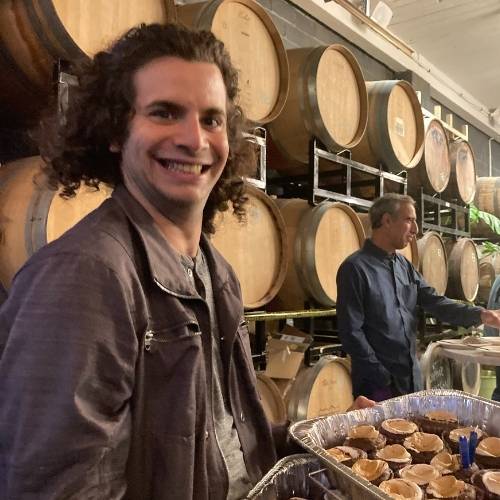
Yaniv Rait
yrait@uw.edu
Preparing for the End of the Eviction Moratorium – Policy Solutions to Prevent a Surge of Evictions
PRACTICUM SITE: Transit Riders Union, Seattle City Council
SITE SUPERVISOR: Devin Silvernail
DEPARTMENT: Health Systems & Population Health
FACULTY ADVISER: Katie Wilson
During the COVID-19 pandemic, eviction moratoriums were set in place, as a means to ensure protection for people who were out of work and unable to pay rent, but also as a means to slow the spread of COVID-19. Washington State had an eviction moratorium which was set to expire on June 30, 2021. This practicum project involved reviewing what three other municipalities were doing in the United States and Canada, to protect tenants and help reduce a tidal wave of evictions expected at the end of the eviction moratorium. This review included synthesis of proposed policies and public support through evaluation of news articles supporting and opposing these policies. This practicum culminated in a final report provided to a district director for Seattle City Councilmember Tammy Morales, as well as presentation to a Seattle housing workgroup.
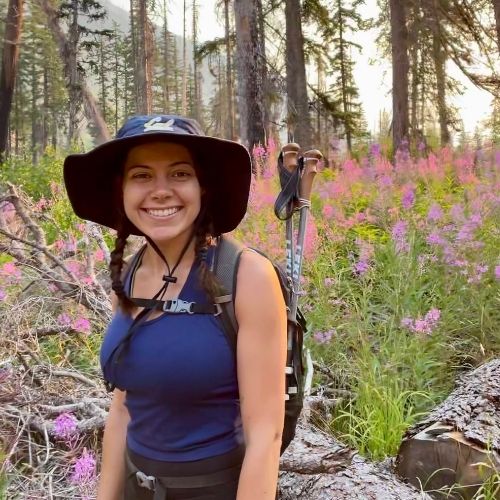
Olivia Angelino
oangel@uw.edu
Creating Evidence-based Materials to Inform Policymakers on Non-communicable Diseases (NCDs) in the Caribbean
PRACTICUM SITE: Institute for Health Metrics and Evaluation
SITE SUPERVISOR: Adrienne Cox
DEPARTMENT: Global Health
FACULTY ADVISER: Rafael Lozano
I am a second-year MPH candidate in Global Health, Health Metrics and Evaluation and a Post-Bachelor Fellow at the Institute for Health Metrics and Evaluation (IHME). I am passionate about using data to uncover health trends and inequities in order to inform meaningful decisions and policies. My current topics of interest are family planning and health system performance. For my practicum, I joined a group of individuals from IHME and the Pan American Health Organization (PAHO) working to produce country-specific reports on non-communicable diseases (NCDs) in island nation states in the Caribbean. I contributed by identifying useful and relevant estimates, creating visualizations of data, and drafting a report template. Once published, the goal is for these reports is to guide policymakers in making evidence-based decisions.
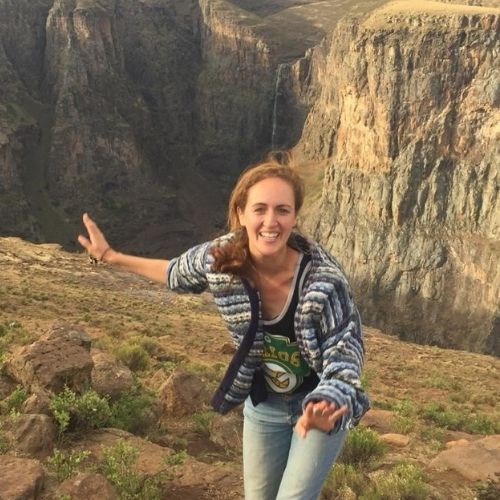
Chelsea Elkins
elkinc@uw.edu
Communicating Public Health Messaging for Internal and External Audiences at I-TECH
PRACTICUM SITE: International Training and Education Center for Health (I-TECH)
SITE SUPERVISOR: Anne Fox
DEPARTMENT: Global Health
FACULTY ADVISER: Hendrika Meischke
As an MPH student within the Department of Global Health, I have long been drawn to the intersection of communications and public health. My practicum experience with the I-TECH Communications Team taught me not only how I-TECH operates but also some of the many complexities of communicating global health effectively. This project included contributing to both internal and external communication efforts. Internally, I helped update the intranet and website as needed, coordinated and edited I-TECH’s internal newsletter, and facilitated a Lunch & Learn session for staff. Additionally, I researched, wrote, and edited three articles that were published on I-TECH’s external website. This included a feature article about disruptions to ART access during COVID-19, as well as two articles where I interviewed and spotlighted I-TECH staff members from around the world. I appreciated the immense support and teachings I received from the Communications Team throughout this experience.
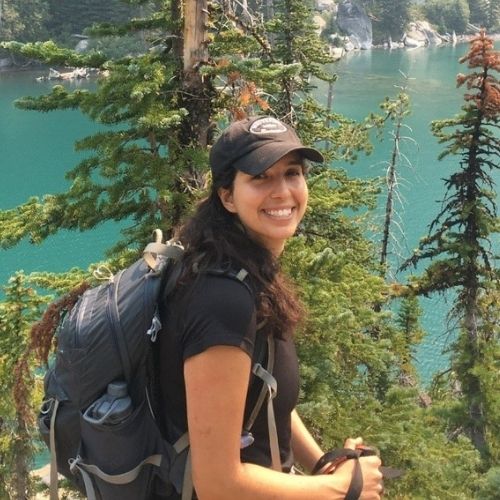
Cory Spencer
corycns@uw.edu
Evaluating the Effect of a Health Provider Training on Responding to Gender-Based Violence in Timor-Leste
PRACTICUM SITE: Health Alliance International
SITE SUPERVISOR: Susan Thompson
DEPARTMENT: Global Health
FACULTY ADVISER: Kayli Wild
I am a second-year MPH candidate in Global Health, Health Metrics and Evaluation and a post-bachelor fellow at the Institute for Health Metrics and Evaluation. My primary interests are the health impacts of gender-based violence and increasing the role of health systems in addressing gender-based violence. For my practicum project, I worked with the HAMNASA (formerly HAI) team in Timor-Leste to evaluate the effect of a healthcare provider training that sought to increase provider knowledge, attitudes, skills, and self-efficacy in recognizing and responding to gender-based violence in clinical practice. My role included designing a data entry system, developing and carrying out analysis of pre/post-training data, and writing up findings to disseminate to project stakeholders. I enjoyed working with a global team with expertise in addressing gender-based violence from within health systems and appreciated the opportunity to gain direct experience with public health program implementation and evaluation.
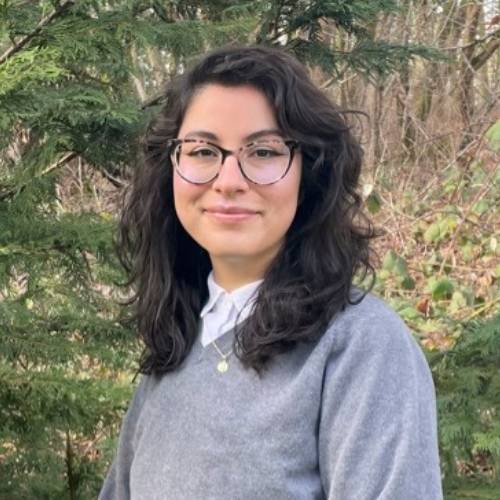
Eli Dalí Davis
bereli@uw.edu
Community-Driven Sexual & Domestic Violence Prevention
PRACTICUM SITE: Oregon Coalition Against Domestic and Sexual Violence
SITE SUPERVISOR: Meagan Schorr
DEPARTMENT: Epidemiology
FACULTY ADVISER: Jason Daniel-Ulloa
I am a second-year MPH candidate in Epidemiology interested in program assessment, evaluation and applied public health practice. I collaborated with the Oregon Coalition against Domestic & Sexual Violence to evaluate their Prevention Through Liberation grant program, which focuses on capacity-building for grantees providing evidence-drive prevention practices. I reviewed archival records related to three grantees, conducted stakeholder interviews, and developed a presentation of findings to share with the Coalition and grantees. In addition, I collaborated with the Sexual Assault Task Force as an intern at the Coalition to develop a statewide training series of facilitated workshops.
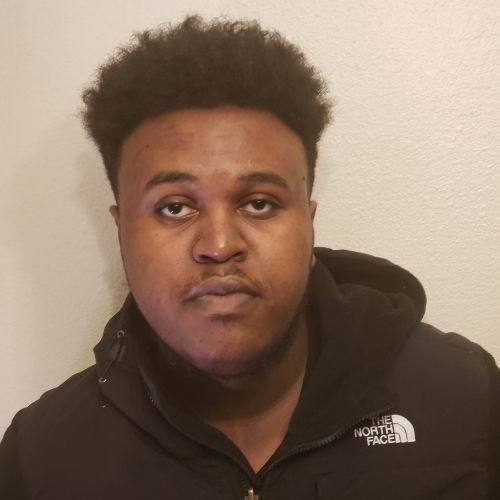
Nathnael S Gebremariam
nath1997@uw.edu
Finding Our Balance Campaign with Washington State Department of Health
PRACTICUM SITE: Washington State Department of Health - Injury & Violence Prevention
SITE SUPERVISOR: Alan Abe
DEPARTMENT: Health Systems & Population Health
FACULTY ADVISER: Amy Hagopian
I am interested in infectious diseases, environmental interventions for infectious disease, disease surveillance, and coordinating public health emergency operations. I want to use my public health skills to study and address infectious disease issues in Ethiopia. From March 2021 to June 2021, I worked for the Washington State Department of Health on a public health campaign named “Finding Our Balance” to reduce falls in older adults in Washington State. My roles included conducting a quantitative analysis of Washington State fall data and conducting a literature review of prior campaigns to reduce falls in older adults in the U.S. Based on this, I developed fall prevention messages that were delivered to various stakeholders/partners in Fire Departments and hospitals around the greater Seattle region.
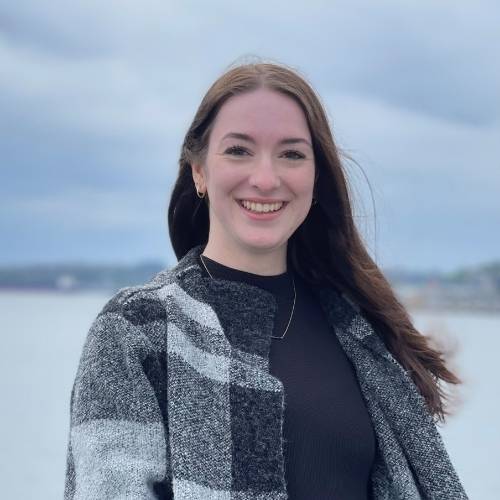
Nicole Asa
Nasa3@uw.edu
Characteristics of Granted and Non-Granted Extreme Risk Protection Orders in Washington
PRACTICUM SITE: Harborview Injury Prevention and Research Center
SITE SUPERVISOR: Miriam Haviland
DEPARTMENT: Epidemiology
FACULTY ADVISER: Ali Rowhani-Rahbar
I am a second-year MPH student in Epidemiology with an interest in injury and violence prevention research. Specifically, I am interested in reducing firearm related deaths and injuries. For my practicum, I worked with the Harborview Injury Prevention and Research Center. My role included data abstraction of Extreme Risk Protection Orders. An Extreme Risk Protection Order is a civil court order that restricts firearm access to individuals who are at high risk of harming themselves or others to reduce firearm deaths and injuries. Along with data abstraction, I also described the characteristics of granted and non-granted Extreme Risk Protection Orders in Washington. Outside of school and work I enjoy cooking, horse-riding, and playing tennis.
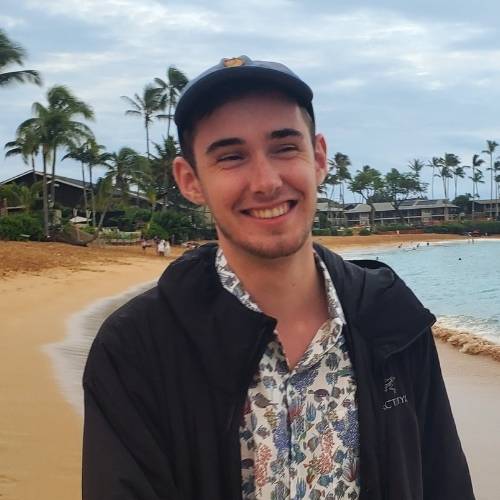
Tyler Jarvis Bonnell
tjb2019@uw.edu
Evaluating the Misclassification of Firearm Injury Intent in Washington State Syndromic Surveillance Data
PRACTICUM SITE: The RHINO Program- Public Health Labs
SITE SUPERVISOR: Amanda Morse
DEPARTMENT: Epidemiology
FACULTY ADVISER: Ali Rowhani-Rahbar
I am a second-year MPH Epidemiology student interested in public health practice, injury and violence prevention, and public health informatics. For my practicum, I worked with the Washington Department of Health (DOH) Rapid Health Information Network (RHINO) team to support their CDC Firearm Surveillance Through Emergency Rooms (FASTER) grant. My role was to apply quantitative and qualitative methods to understand how firearm injury intent (e.g. accidental, intentional self-harm, or assault) is captured and recorded within emergency departments as well as investigate why some patient visit records indicate multiple, conflicting injury intents. Through this practicum I gained experience using syndromic surveillance tools, analyzing electronic medical record data, leading semi-structured interviews, and conducting natural language processing analyses. These skills will be invaluable moving forward as I complete my thesis and begin my career in applied epidemiology. Outside of the world of epidemiology, I love to ski, surf, slackline, make smoothies, and lose at Catan.
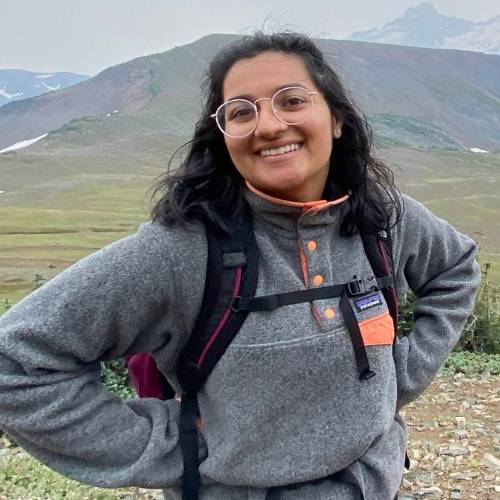
Anjali Vasavada
anjaliv@uw.edu
Evaluating "HPV Free Washington" in a Local Pediatric Clinic
PRACTICUM SITE: Health Promotion Research Center
SITE SUPERVISOR: Thuy Vu
DEPARTMENT: Epidemiology
FACULTY ADVISER: Peggy Hannon
I was given the opportunity to work with the Washington Department of Health’s Comprehensive Cancer Control Program for my practicum project. I evaluated a project called “HPV Free Washington” which sought to increase HPV vaccination uptake in patients aged 9-10 years old through the delivery of video sessions, post-video coaching sessions, and one-on-one technical assistance. I am particularly interested in implementation of clinic-based programs and factors that influence the scalability of programs that are informed by research. My practicum project sought to understand the acceptability and feasibility of implementing the HPV Free WA program in a clinic through qualitative interviewing, as well as the extent to which providers and clinic support staff believed the program can help to increase HPV vaccination rates among patients aged 9-10, and patients overall. Outside of school, I love to dance (specifically Bollywood and hip-hop) and explore new neighborhoods in Seattle.
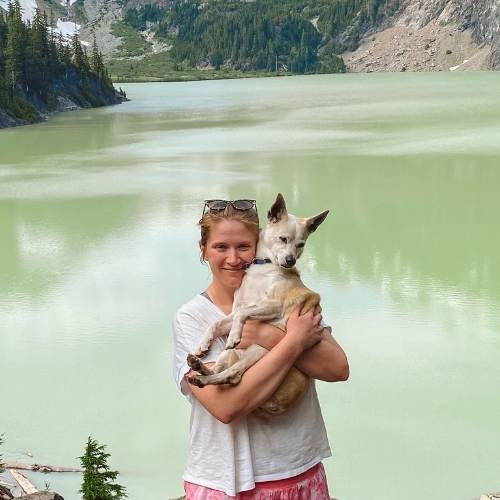
Caitlin Bowman
cebowman@uw.edu
Developing Strategy Recommendations for Digital Square’s Regional & Country Systems
PRACTICUM SITE: PATH - Digital Square
SITE SUPERVISOR: Lauren Wall
DEPARTMENT: Global Health
FACULTY ADVISER: Stephen Gloyd
I am a first-year MPH Global Health candidate with interests in the social determinants of health, health equity, and global mental health. For my practicum, I worked with Digital Square at PATH to create recommendations for the development of Digital Square’s strategy for 2023. More specifically, this work aimed to better align donor decisions with country needs, in an effort to prioritize the country vision, country office priorities, and Digital Square values. My work involved conducting document review, stakeholder interviews, and qualitative data analysis, as well as developing a presentation and report on the findings. In my free time, I enjoy hiking with my dogs, traveling, and watching football.
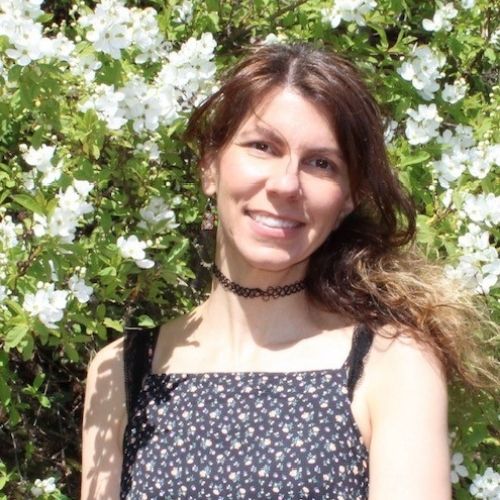
Christina N Mazumder
tri4rain@uw.edu
A Collaboration with Nursing Students and Faculty attending the Global Leadership Nursing & Midwifery Program at the University of Global Health Equity in Kigali, Rwanda
PRACTICUM SITE: University of Global Health Equity
SITE SUPERVISOR: Judy Khanyola
DEPARTMENT: Global Health
FACULTY ADVISER: Pamela Kohler
I am a second-year MPH candidate studying Global Health with interests in community-based practice and research, enhancing global delivery of primary care services and strengthening the nursing workforce capacity in resource-limited regions of the world. For my practicum, I worked with the Global Leadership Nursing & Midwifery Program in Rwanda to support nursing students and faculty. This program is the first in East Africa designed to equip nurses and midwifes with leadership skills. The GLNM program emphasizes the importance of including nurses and midwives at the decision-making table, alongside Ministry of Health and other key stakeholders, to advocate for health equity. Attending lectures/discussions as a mentor was an important enhancement to my education because I was granted a special lens enabling me to learn directly from the perspectives of content area experts located in the global south, who interact firsthand with the challenges faced in regions with high morbidity and mortality. Professionally, I am a primary care nurse working in chronic disease management.
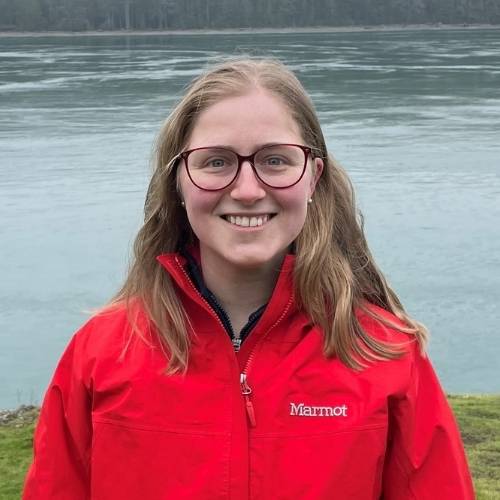
Emma Rogowski
rogowski@uw.edu
Quantifying, communicating, and visualizing racial disparities in causes of death and life expectancy in Harford County, Maryland
PRACTICUM SITE: Harford County Health Department-- Epidemiology and Vital Statistics Team
SITE SUPERVISOR: David Bishai
DEPARTMENT: Global Health
FACULTY ADVISER: Jonathan Mosser
I am a second year MPH student in the Global Health Department - Health Metrics and Evaluation track. My interests lie in infectious disease epidemiology, disease modeling, and quantifying health disparities. My practicum was at the Harford County Department of Health in Maryland, where I worked with death certificate data and state-level mortality rate data to calculate life expectancy by race and sex, quantify racial disparities in life expectancy, and decompose the disparities by cause of death to identify the biggest contributors. This revealed cardiovascular causes of death to be a major driver of the higher mortality rate. We shared the results with the community health workers and local chapter of the NAACP to collaborate with community members on intervention design, and developed plans to hold free community physical activity classes and mobile clinics. I am grateful for the opportunity to work at the local level and see first-hand the need for timely analyses and community partnership at work.
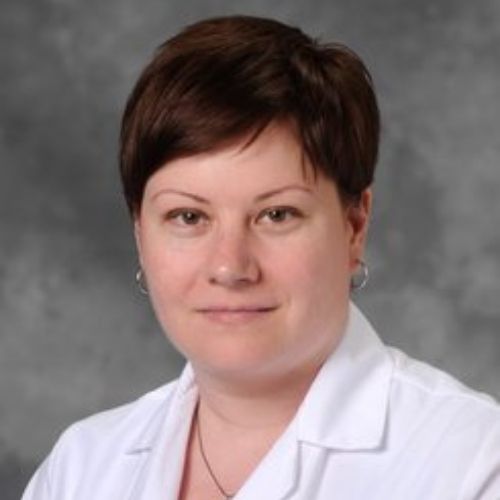
Jenny Grunwald
jgrunw13@uw.edu
Country-level Landscape Analysis in Support of Countries for the Development and Implementation of National Essential Diagnostics Lists for In Vitro Diagnostics
PRACTICUM SITE: International Training and Education Center for Health (I-TECH)
SITE SUPERVISOR: Genya Shimkin
DEPARTMENT: Online MPH
FACULTY ADVISER: Lucy Perrone
I am a second year MPH student in Health Systems & Population Health interested in infectious diseases, infection control, antimicrobial resistance, and new and emerging viral pathogens. I am also pursuing a graduate certificate in One Health. For my practicum, I worked with The African Society of Laboratory Medicine (ASLM) and Foundation for Innovative New Diagnostics (FIND). Many African countries are implementing essential health packages; however, diagnostics are often missing or are not adequately covered in these documents. Twelve African Countries expressed interest to the World Health Organization (WHO) to help develop National Essential Diagnostic Lists (NEDL). Working with members of ASLM and FIND, a landscape analysis was performed with a review of African countries’ national health plans, which included infectious and non-communicable diseases, for diagnostic testing and procurement. Gaps in national health plan documents and diagnostic testing were identified in order to start the process of developing NEDL for those countries.
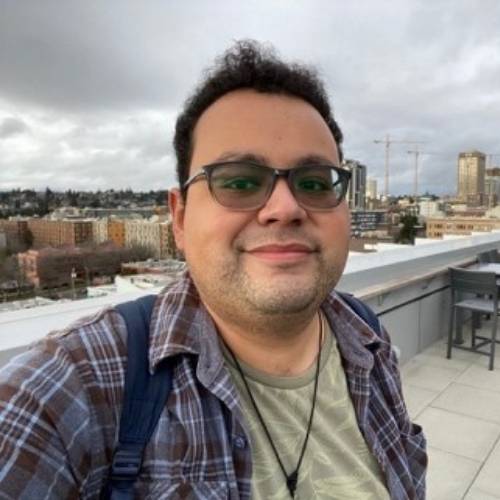
Juan Sorto Jr.
js284@uw.edu
Feasibility Analysis of a Cannabis Prevention Program Delivered at Point of Sale to Adult Consumers with Minors at Home
PRACTICUM SITE: Public Health- Seattle & King County
SITE SUPERVISOR: Sarah Ross-Viles
DEPARTMENT: Health Systems and Population Health
FACULTY ADVISER: Beatriz Carlini
I am a second year MPH candidate in Health Systems and Population Health with interests in qualitative and mixed methods research and LGBTQIA health. For my practicum, I worked with Public Health-Seattle & King County to assess the feasibility of a safe storage campaign across cannabis stores in King County for adult cannabis users with minors at home. One of my roles included interviewing retail collaborators across Washington State to learn about their experiences distributing safe storage devices in their respective counties. This information provided me with a few ideas in deciding which best practices (e.g, using campaign cards, building rapport with retailers) to incorporate in our safe storage campaign across King County. I designed a process evaluation that will assess if safe storage devices are effective in reducing overconsumption of cannabis among minors. In my free time, I love to cook, bake, hike, and take landscape photography.
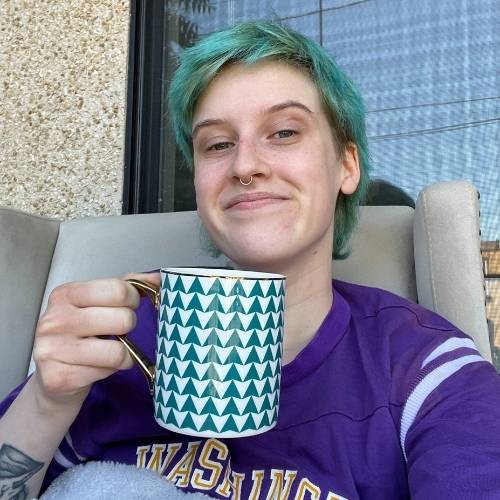
Kase Cragg
kcragg@uw.edu
Development of the UW Transgender & Non-Binary (TGNB) Health Program, in Partnership with the Office of Health Equity (OHE)
PRACTICUM SITE: UW Medicine Transgender & Non-Binary Health Program
SITE SUPERVISOR: Sean Johnson
DEPARTMENT: Health Systems & Population Health, dual degree - Social Work
FACULTY ADVISERS: Emily Williams, Jennifer Brower
I am a third-year dual MSW-MPH student with interests in equitable healthcare access, harm reduction, and quality assurance for gender-affirming care. For my practicum, I utilized my training as a social worker and public health researcher along with my lived experience as a trans person to help UW increase the capacity of their Transgender & Non-Binary Health (TGNB) Program. This included: Developing content for the TGNB health program website; providing, attending, and editing the Office of Health Equity (OHE) trainings to specific student/provider populations; responding to ongoing policy changes effecting coverage of TGNB care at the state level and among individual insurance providers; and attending collaborative groups for TGNB medical programs across the state and U.S. to share resources. This experience taught me the intricacies of health program development and insurance coverage for gender-affirming care, and I hope to use what I have learned to continue to make healthcare safer and more trauma-informed for transgender people.

Moira Majaha
mm4059@uw.edu
Developing a supervisory training for Zimbabwean Supervisors with I-TECH
PRACTICUM SITE: International Training and Education Center for Health (I-TECH)
SITE SUPERVISOR: Vivian Bertman
DEPARTMENT: Global Health
FACULTY ADVISER: Deepa Rao
As a Zimbabwean, I have had many conversations with healthcare workers in Zimbabwe who work in Parirenyatwa Hospital on how to strengthen the healthcare system and improve health outcomes. I learned that there has been a lot of pressure on nurses and doctors to produce quality service while receiving little support from their supervisors. When an opportunity came to work with I-TECH on creating a tablet-based training program for these supervisors, I knew it would align perfectly with my interests. For my practicum, I developed a supervisory training program and a toolkit for supervisors at various levels in the ministry of health (national, district and local) who work with HIV/AIDS clinical programs. I was able to develop my qualitative research skills and learn about the backward design process used in curriculum development. I hope to continue to use these skills in my future career in HIV/AIDS program implementation. I enjoy rock climbing, running, and reading cheesy novels when I am not combing through academic papers about adolescents living with HIV transitioning to adult care.
 <
<
Rachel Ross
rross4@uw.edu
Connecting Communities to Transformative Care: A Program Evaluation of the OneCall Pilot Study
PRACTICUM SITE: Emergency Medical Services
SITE SUPERVISOR: Marlee Fischer
DEPARTMENT: Health Systems and Population Health
FACULTY ADVISER: Hendrika Meischke
I am a second-year MPH student in Health Services interested in improving healthcare access and utilizing program evaluations to enhance services that promote healthy aging and substance use interventions in vulnerable populations. For my practicum, I partnered with Marlee Fischer and the Emergency Medical Services (EMS) department at Public Health – Seattle & King County to conduct an evaluation of their pilot program, OneCall. OneCall, a single portal referral service, enabled first responders to connect low-acuity behavioral health patients to more appropriate healthcare services. I was responsible for conducting interviews and completing a thematic analysis to determine our findings. I was also responsible for presenting the final report of the program evaluation to stakeholders as part of King County’s Vulnerable Populations Strategic Initiative (VPSI). I enjoyed the opportunity to work with various EMS agencies and to work on a project that will better equip first responders to serve vulnerable populations in King County, setting up patients for long-term care that will properly address their healthcare needs.
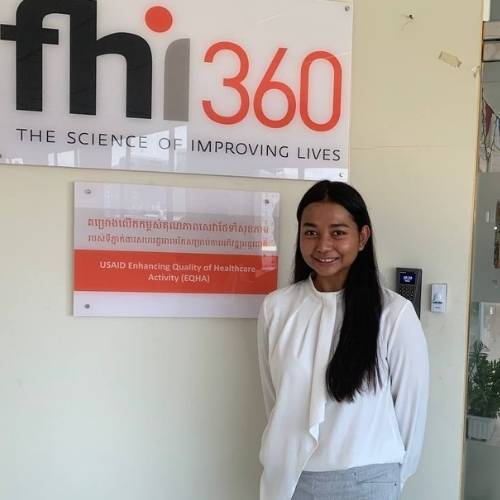
Sopheakvatey Chey
sophec@uw.edu
USAID-Enhancing Quality of Healthcare Activity (USAID-EQHA)
PRACTICUM SITE: FHI360 (Family Health International)
SITE SUPERVISOR: Chanvatanak Ly
DEPARTMENT: Global Health
FACULTY ADVISER: Jeff Lane
Last summer, I had an opportunity to intern for FHI 360 Cambodia on their USAID Enhancing Quality Health Care Activity for two and a half months in Phnom Penh, Cambodia. I worked closely with the Objective Three Team on strengthening regulatory framework, implementation, and enforcement. I conducted reviews of frameworks such as the Consolidated Framework for Implementation Research (CFIR), the Services Availability and Readiness Assessment (SARA), and the Leading Change, to just name a few. One of my primary responsibilities for the Objective Three Team was to create an assessment questionnaire. The questionnaire was used to understand the facilitators and the barriers of the Pharmacy Council of Cambodia and served as documentation of best practices for future adoption. Additionally, I drafted a Continuous Quality Improvement assessment tool (CQI) for the family planning (FP) private facilities as a tool to improve the quality of care of FP services. I am very grateful for this experience despite some challenges that I faced due to the COVID-19 pandemic. Through this process, I have grown so much professionally and personally. I would like to thank everyone who had helped me realized this experience.
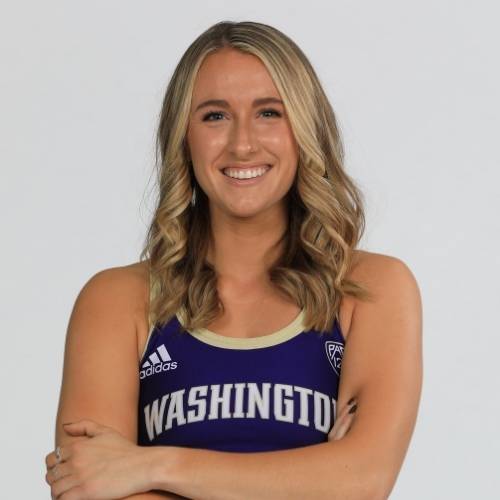
Victoria Gersch
vcgersch@uw.edu
Incorporating Health Equity Work into Strategic Planning
PRACTICUM SITE: Community Health Plan of Washington
SITE SUPERVISOR: Kayla Salazar
DEPARTMENT: Health Systems and Population Health
FACULTY ADVISER: Linda Ko
I am passionate about advancing equity, reducing disparities, and addressing social determinants of health. I chose to do my practicum with Community Health Plan of Washington (CHPW), a non-profit Managed Care Organization (MCO) that provides health coverage and whole person care to Washington's Medicaid and Medicare members. I worked with the Equity and Quality Performance team to advance CHPW’s efforts surrounding equity and analyzed health disparities facing Washington’s underserved communities. The resulting report detailing the major disparities experienced by CHPW members highlights key strategies to reduce these disparities. It was used to inform CHPW’s priorities and goals in 2022 and help staff across the organization to better understand the health disparities affecting our members so we can implement programs, policies and practices to address them and improve the health of communities across the state.
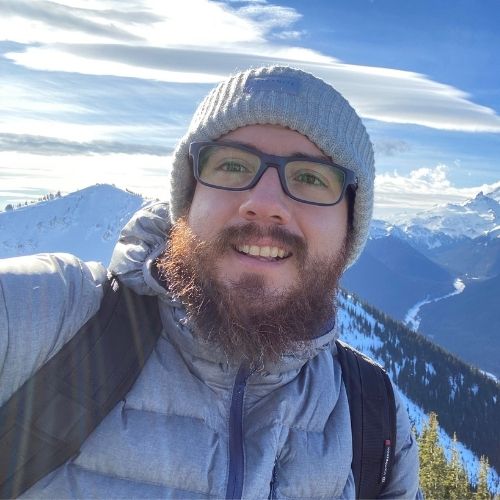
Horacio Chacon Torrico
hchacont@uw.edu
Promoting the Use of program data to improve performance of the ZimPAAC HIV epidemic control program in Zimbabwe
PRACTICUM SITE: International Training and Education Center for Health (I-TECH)
SITE SUPERVISOR: Claudios Muserere
DEPARTMENT: Global Health
FACULTY ADVISER: Stefan Wiktor
I am a second-year Global Health MPH candidate in the Health Metrics and Evaluation track. My interests revolve around the intersection of global health metrics and technology. Thus, I decided to work with the Zimbabwe Technical Assistance, Training & Education Center for Health (Zim-TTECH) for my practicum by assessing how the organization, particularly facility and district-level staff, use routinely collected data to evaluate programmatic performance. My role included interviewing cadres at different levels of the organization to identify perceptions and barriers to data use. This experience improved my qualitative analytic skills and allowed me to propose relevant recommendations for a country-level HIV care and treatment program.
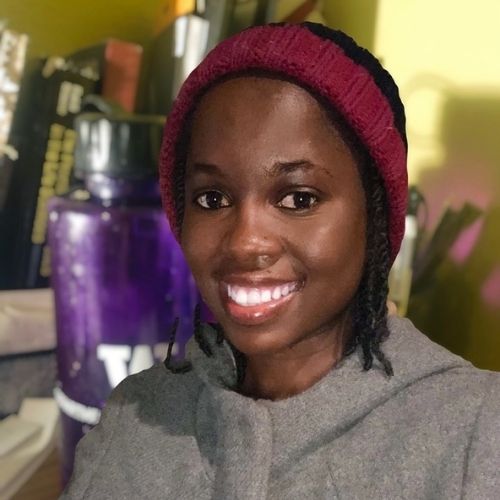
Hilma Nakambale
hilman2@uw.edu
Supporting the implementation of the TB Preventative Therapy (TPT) and optimized Provider Initiated Testing and Counselling (PITC) programs in Namibia
PRACTICUM SITE: International Training and Education Center for Health (I-TECH)
SITE SUPERVISOR: Alison Ensminger
DEPARTMENT: Global Health
FACULTY ADVISER: Gabrielle O'Malley
I am passionate about program implementation, particularly, addressing early implementation barriers and identifying facilitators. For my practicum, I worked on two programs supported by I-TECH in Namibia. The first program was the TB Preventative Therapy (TPT) program, where I-TECH is providing support to the Ministry of Health with the implementation of the new shorter duration TPT for patients on ART. The other program was the Provider Initiated Testing and Counselling (PITC) program aimed at providing support and monitoring facilities to improve HIV testing efficiency and address sustainability concerns related to high HIV testing volumes. I performed weekly assessment of targets and graphed facility results to determine progress toward targets for distribution to facility teams. I identified implementation areas where facilities had challenges and provided guidance and recommendations for training. I also was the secretary for the weekly care& treatment calls and circulated call notes to call attendees/invitees.
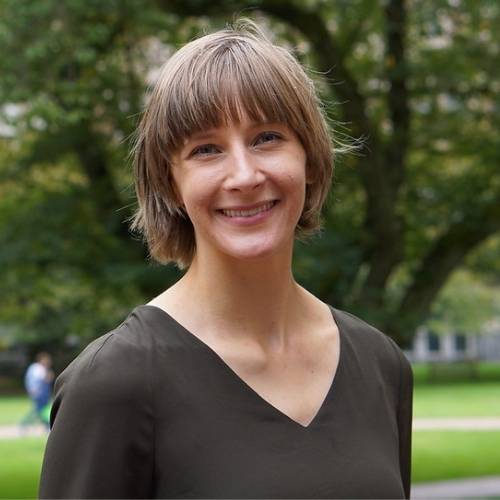
Amy Ervin
ahuntea@uw.edu
Improving Fruit and Vegetable Prescription Processes
PRACTICUM SITE: Washington State Department of Health—FVIP & HEAL
SITE SUPERVISOR: Alyssa Auvinen
DEPARTMENT: Nutritional Sciences
FACULTY ADVISER: Anne Lund
I am working with the Washington State Department of Health (DOH) to research improvements to the Fruit and Vegetable Prescription Program and create an application process for providers. The prescription program currently works with clinics and public health centers to provide vouchers for food insecure individuals to redeem for produce at Safeway stores. Participants experience measurable improvements in diet quality and improvements in chronic disease management. The prescription program is interested in electronic benefit mechanisms to improve access statewide and increase the availability of culturally appropriate foods. I am assessing program needs by performing key informant interviews within the DOH, meeting with vendors, and interviewing other produce prescription program administrators to gather information and lessons learned. Additionally, I am preparing a provider application and procedural timeline in line with governing legislative rules. The results of this project will provide a framework for additional healthcare partners to get involved with the Fruit and Vegetable Prescription Program, and inform a future Request for Applications (RFA) to obtain bids and funding for an electronic benefits mechanism.

Huiyu (Stella) Zhou
huiyu98@uw.edu
University of Washington International Student Immunization Study
PRACTICUM SITE: UW Hall Health
SITE SUPERVISOR: Anne Terry
DEPARTMENT: Health Systems and Population Health
FACULTY ADVISER: Patricia Atwater
I am a second-year MPH candidate in the Department of Health Systems and Population Health and an international student from Shanghai, China. For my practicum, I worked with a team of UW MPH students (Victoria Bowers, Monserrat Morales Miranda) to help Hall Health Center better understand UW international students’ attitude towards routine immunizations and the COVID-19 vaccine. We collected and analyzed qualitative data to evaluate the different factors that affect international students’ perceptions and attitudes toward various vaccinations. We assessed the effectiveness of Hall Health’s strategies in engaging international students. I converted the final demographic survey into an accessible online form using Google Forms software and modified all figures within the final report to present findings. In my free time, I love skiing and playing various musical instruments.
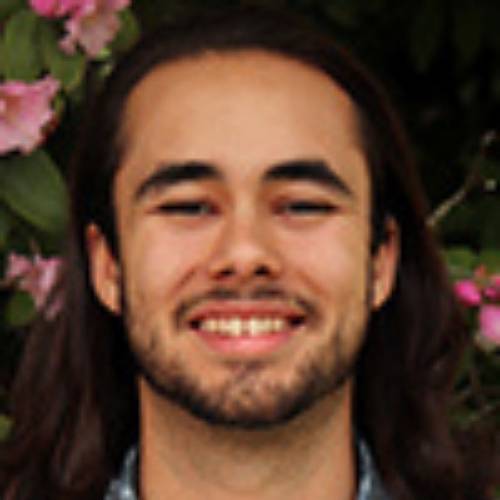
Jarred Rimby
jrimby@uw.edu
Seattle Veterinary Outreach COVID-19 Vaccine Ambassadorship
PRACTICUM SITE: Seattle Veterinary Outreach
SITE SUPERVISOR: Hanna Ekstrom
DEPARTMENT: Global Health
FACULTY ADVISER: Amy Hagopian
I am a second year MPH student in the Department of Global Health general track. I am interested in medical anthropology and occupational health. For my practicum, I worked with Seattle Veterinary Outreach (SVO) on a grant from Seattle King County Public Health to increase COVID-19 vaccination among those experience housing insecurity in Seattle, and research vaccine hesitancy. My primary research questions were: Where and how do SVO’s clients access information about COVID-19? And to what degree do SVO’s clients trust COVID-19 related information from various public health entities? My role was to help maximize data collection and outreach. I attended SVO events January-March 2022 and linked participants to COVID-19 vaccination clinics. It has been exciting to have the opportunity to apply some of my global health skills in a local public health context, and to get a chance to work on outreach and research related to COVID-19 and vaccination.

Jessica Chen
jc1111@uw.edu
COVID Vaccination Outreach Quality Improvement in the VA Puget Sound
PRACTICUM SITE: VA Puget Sound Health Care System
SITE SUPERVISOR: Stefanie Deeds
DEPARTMENT: Epidemiology
FACULTY ADVISER: Alyson Littman
I am a second year MPH student in Epidemiology interested in implementation science, program evaluation and mental health. Over the course of the practicum, I worked with the Primary Care Analytics Team of the VA Puget Sound to support and reflect on ongoing outreach efforts to provide COVID vaccinations to Veterans. The goal of this project was to speak to Veterans who received the vaccine 3-4 months after it had been made available. I designed an interview guide, conducted 19 interviews, and analyzed the qualitative data using a modified Rapid Analysis Process. I presented key findings and developed a set of recommendations for the team. These recommendations were aimed to help the agency better understand Veterans’ perspectives on barriers and facilitators to delivering vaccinations and to provide insights into conducting a successful vaccine campaign. With this project, I was able to further my qualitative skill set which can aid in my goals to becoming a well-rounded epidemiologist with an emphasis on mixed methods and community based work.
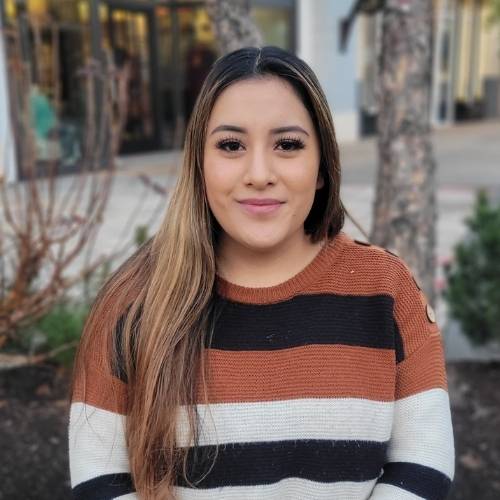
Monserrat Morales Miranda
monsem2@uw.edu
University of Washington International Student Immunization Study
PRACTICUM SITE: UW Hall Health
SITE SUPERVISOR: Anne Terry
DEPARTMENT: Health Systems and Population Health
FACULTY ADVISER: Patricia Atwater
I believe that prevention plays a major role in people’s health and want to dedicate my career reducing health disparities and social inequalities that underserved communities experience on a daily basis. For my practicum, I worked with UW Hall Health Center to better understand how UW international students feel about routine immunizations, such as influenza and MMR (measles, mumps, and rubella), as well as the COVID-19 vaccine. The conclusions derived from this project helped to inform a UW campaign to improve immunization confidence and uptake among UW international students. My practicum experience allowed me to grow professionally and gain knowledge in qualitative methods. I love to spend my free time making pastries and sweet treats with my mom.

Maxwell Pierce
piercems@uw.edu
FHCRC and SCCA Community Vaccination Clinics and the Impact on Focal Populations
PRACTICUM SITE: Seattle Cancer Care Alliance
SITE SUPERVISOR: Janelle Wagner
DEPARTMENT: Global Health
FACULTY ADVISER: Alison Roxby
I am currently a Post-Bachelor Fellow at IHME, working primarily on vaccination forecasts with the Future Health Scenarios team. For my practicum, I worked with Nate Higgins and Dr. Alison Roxby on analyzing trends in COVID-19 vaccination in the Seattle area. In 2020, the Seattle Cancer Care Alliance (SCCA) established a broad COVID-19 vaccination program, with hospital-based and community-outreach vaccination centers. Community-outreach vaccination centers were established with the goal of providing underserved populations in King County with access to COVID-19 vaccines. I analyzed existing data in regards to race and ethnicity of those vaccinated by these clinics from January through July of 2021 and was charged with identifying trends or patterns, both over time and between community clinics and hospital-based vaccination programs.
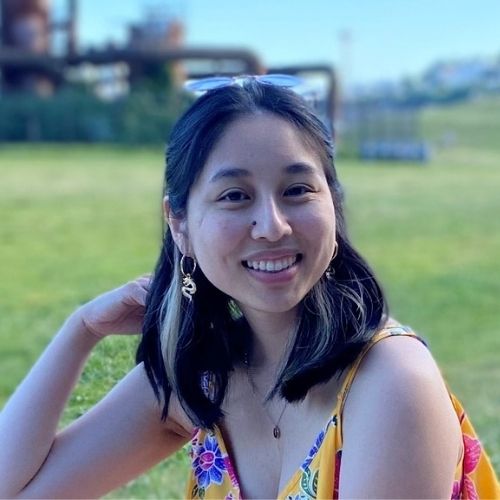
Victoria Chan
vchan790@uw.edu
SVO Implementation: COVID-19 Vaccination Rates
PRACTICUM SITE: Seattle Veterinary Outreach Mobile Veterinary Clinic Van
SITE SUPERVISOR: Hanna Ekstrom
DEPARTMENT: Health Systems & Population Health
FACULTY ADVISER: Amy Hagopian
I am a first-year MPH student studying in the Health Systems and Population Health (HSPOP) general tract. The Seattle Veterinary Outreach (SVO) provides free veterinary services to low income and homeless pet owners living in the Seattle area. They have received a grant with the Public Health Seattle King County and for my practicum, I was given the opportunity to work with SVO as a COVID ambassador, partnering with two other UW MPH students, to help improve COVID-19 vaccination rates with low-income and homeless population SVO serves in its mobile clinics. In my research I looked into the experience of SVO in providing a vaccine ambassador program with this population, and what is the theory (and implementation experience) behind why an entree through pet ownership would be successful?

Elliot Wills
ejwills@uw.edu
Virus and Violence
PRACTICUM SITE: The RHINO Program - Public Health Labs
SITE SUPERVISOR: Cody Carmichael
DEPARTMENT: Health Systems & Population Health
FACULTY ADVISER: India Ornelas
I chose a career in public health because I know the greatest impact I can have on my community is through my contribution to research. In the summer of 2020, I participated in the Black Lives Matter protests around Seattle. Despite the clear need for protest in an era of systemic racial injustice, I could not help but worry that these large gatherings, before vaccines were available, were super spreader events for COVID-19. In my practicum, I worked with the Department of Health's Rapid Health and Information team to examine the spread of COVID-19 associated with the protests. Looking through syndromic data, I assisted them in creating an analysis utilizing text-mining and statistical approaches to approximate spread of COVID-19 at these protests through emergency room triage notes. We also started a secondary analysis on injuries from police intervention methods.
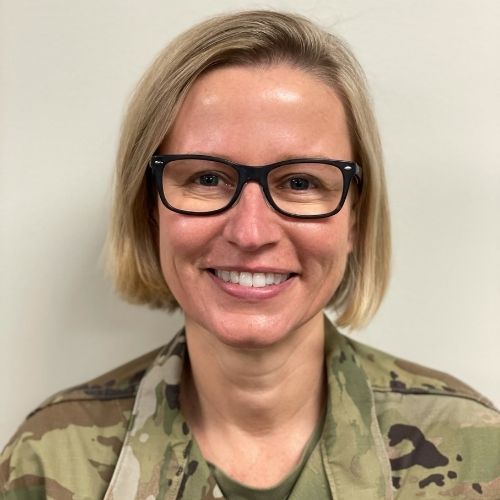
Erika Petrik
petriker@uw.edu
"Syphilis 101" Training for Community Providers to Reduce Rates of Congenital Syphilis in Pierce County, WA
PRACTICUM SITE: Tacoma Pierce County Health Department
SITE SUPERVISOR: Nigel Turner
DEPARTMENT: Global Health
FACULTY ADVISER: Steve Gloyd
Currently I am a second-year MPH student in Global Health while concurrently completing a Residency in Preventive Medicine at Madigan Army Medical Center in Tacoma, WA. The Tacoma Pierce County Health Department (TPCHD) provides coordination and leadership to identify and resolve public health threats in the community. A concerning increase in the rates of Syphilis, particularly Congenital Syphilis has occurred within the past five years. Since 2017 there has been a 533% increase in the yearly cases of Congenital Syphilis in Pierce County. Several social determinants of health are contributing to this. I was privileged to work on a project to examine these determinants and develop a Provider-focused education program, dubbed "Syphilis 101", with the ultimate goal of reducing the rates of Congenital Syphilis within Pierce County. When I'm not at school or attending Residency, I enjoy spending time with my husband Tim and three children (Chynna, Benji, and Izzy) as well running in the nearby park and striving to bake the perfect chocolate chip cookie (I haven't achieved it yet, but that hasn't stopped me from trying)!
Outstanding Mentors
Students nominated dozens of mentors who went above and beyond to help them gain practical knowledge and contribute meaningfully to the field.
Faculty Advisors:
Site Supervisors (Name, Organization):
Alison Newman, Alcohol and Drug Abuse Institute
Amanda Morse, The RHINO Program - Public Health Labs
Aziza Mwisongo, PATH Typhoid Vaccine Acceleration Consortium
Chanvatanak Ly, FHI360 Cambodia
David Bishai, Epidemiology and Vital Statistics Team, Harford County Health Department
Do-Quyen Pham, Youth Clinic
Emmanuela Gakidou, Institute for Health Metrics and Evaluation
Gina Sequeria, Seattle Children's Hospital Gender Clinic
Joe Dieleman, Institute for Health Metrics and Evaluation
Jon Ehrenfeld, Medic One (Health One), Seattle Fire Department
Julia Dettinger, Global Center for Integrated Health of Women, Adolescents, and Children (Global WACh)
Kayla Salazar, Community Health Plan of Washington
Mark Shepard, International Training and Education Center for Health (I-TECH)
Marlee Fischer, Emergency Medical Services, Public Health - Seattle & King County
Matthew Golden, Sexual Health Clinic, Harborview Medical Center, Public Health - Seattle & King County
Meagan Schorr, Oregon Coalition Against Domestic and Sexual Violence
Nicole Marshall, Communicable Disease Epidemiology, Washington State Department of Health
Roxanne Kerani, Sexual Health Clinic, Harborview Medical Center, Public Health - Seattle & King County
Sarah Ross-Viles, Public Health Seattle & King County
Sean Johnson, UW Medicine Transgender and Gender Non-Binary Care
Vivian Bertman, International Training and Education Center for Health (I-TECH)
